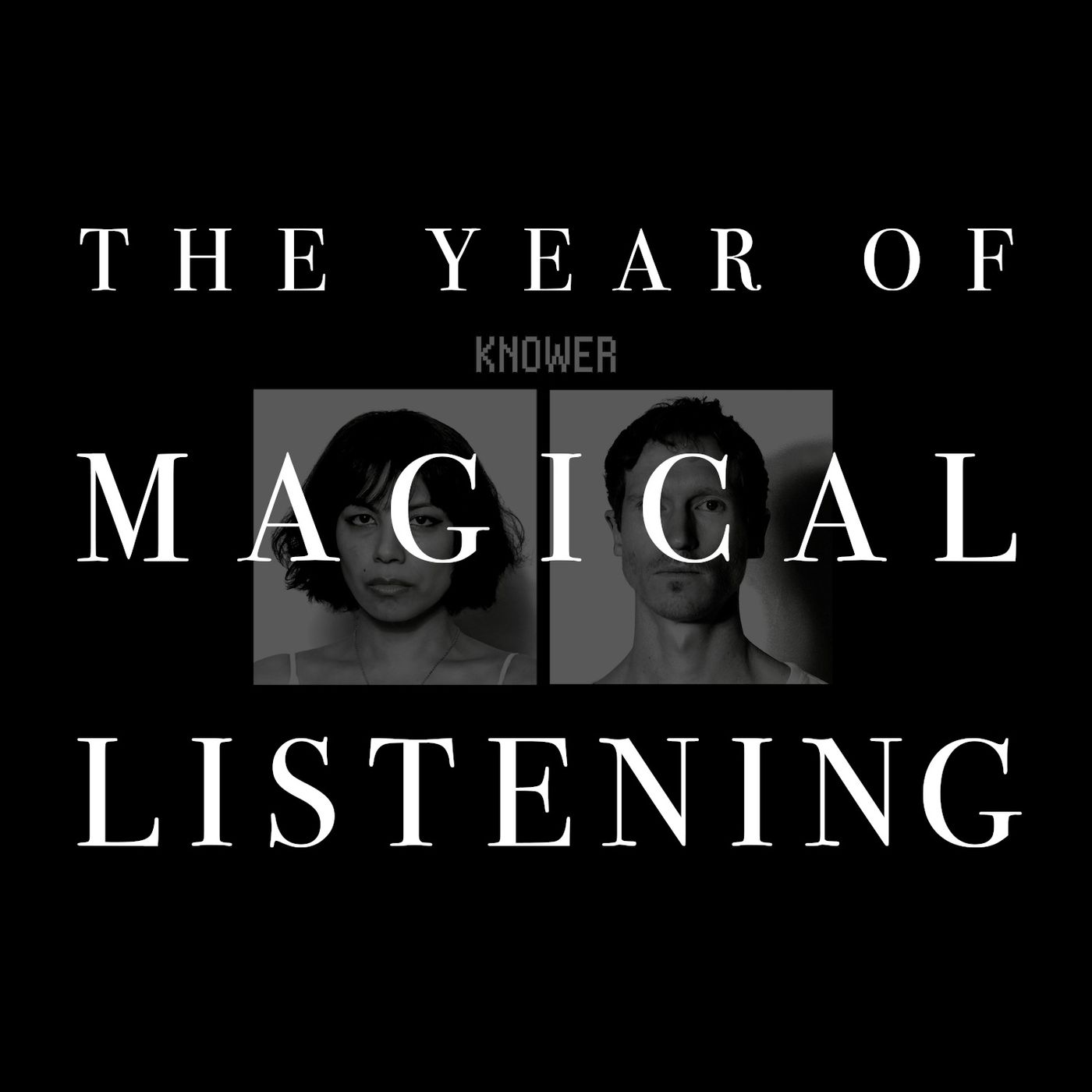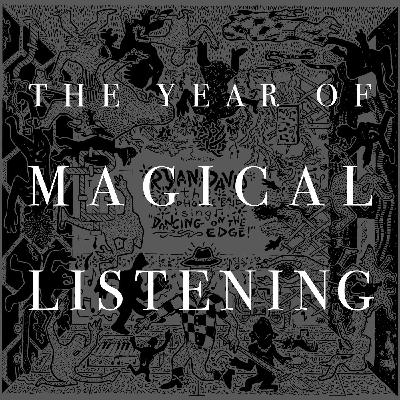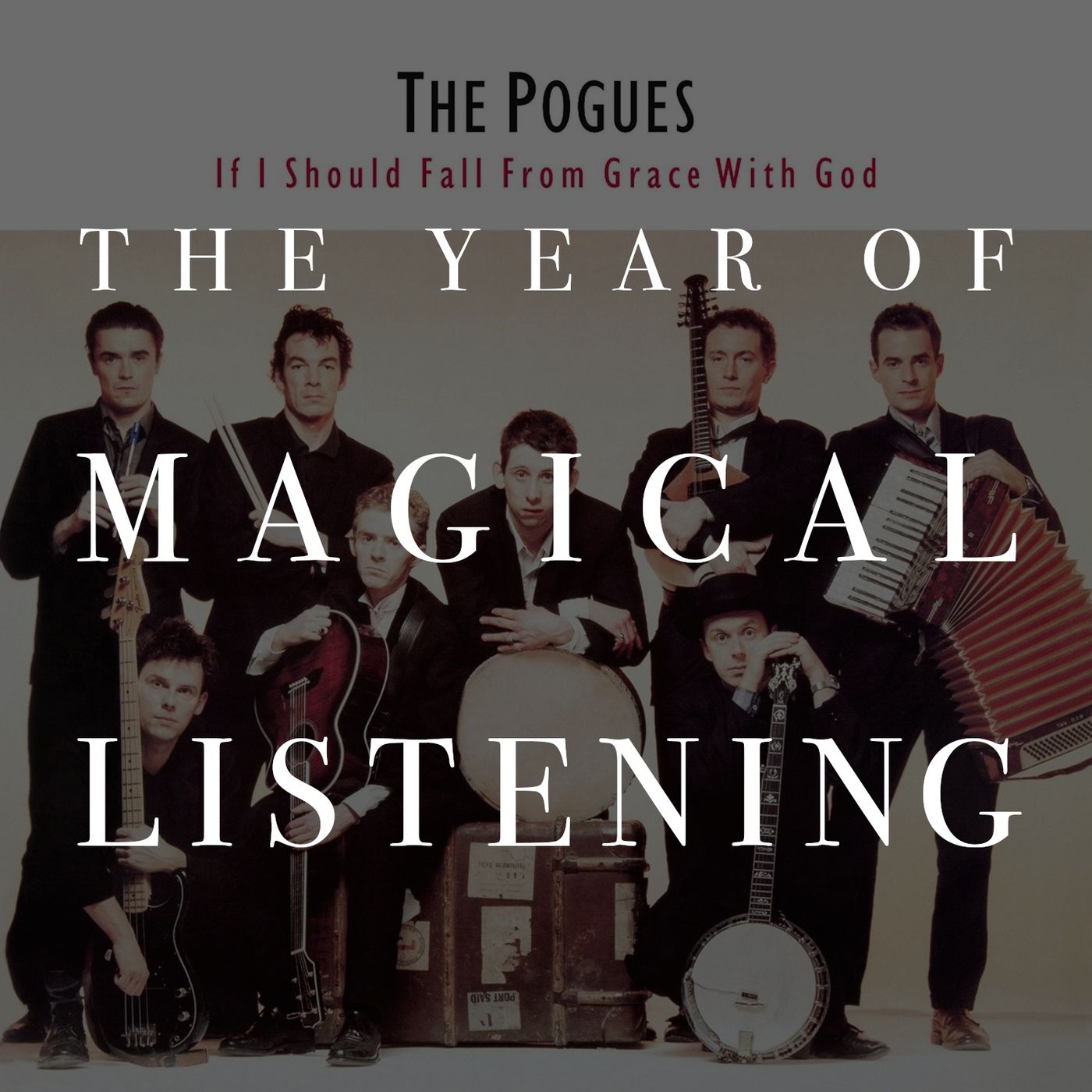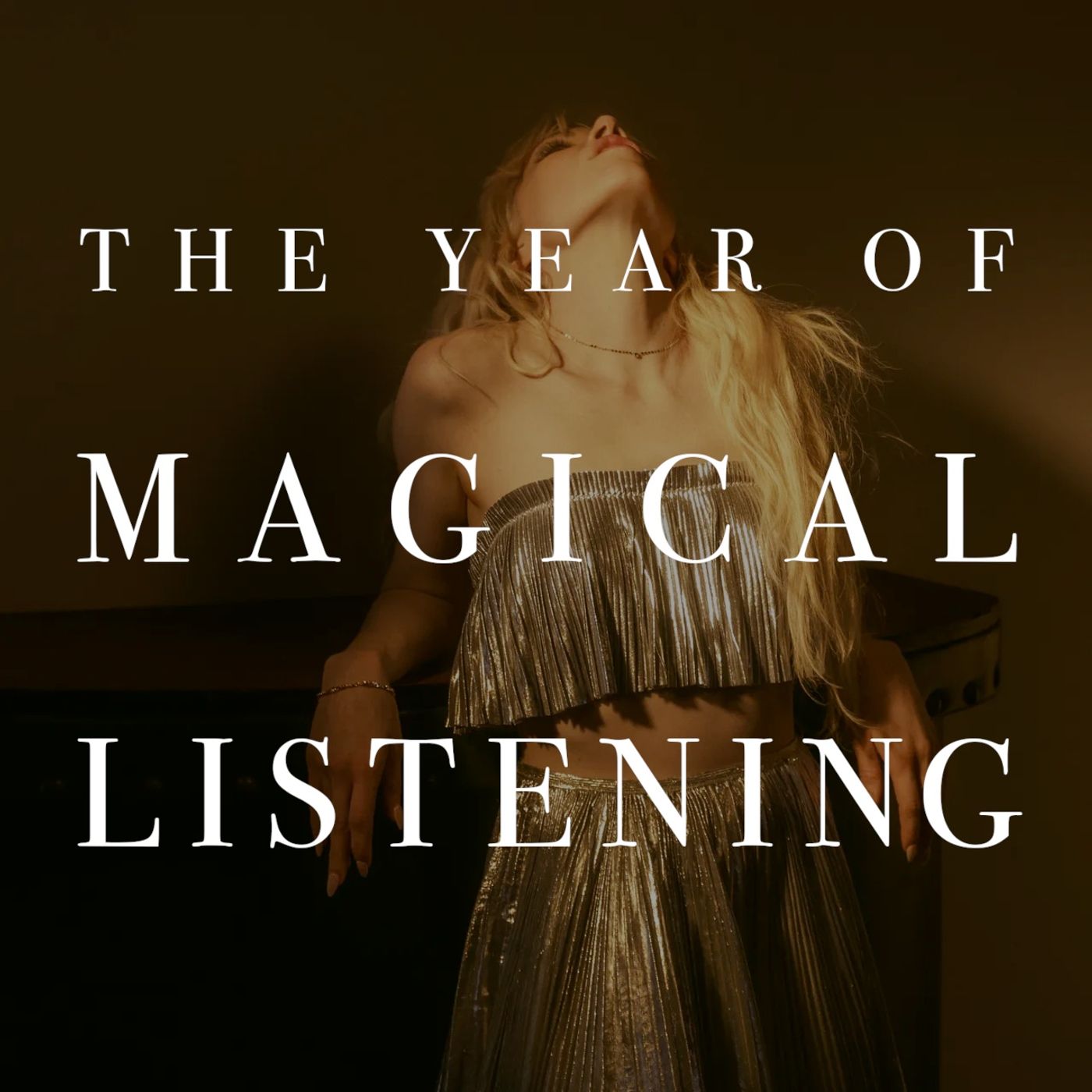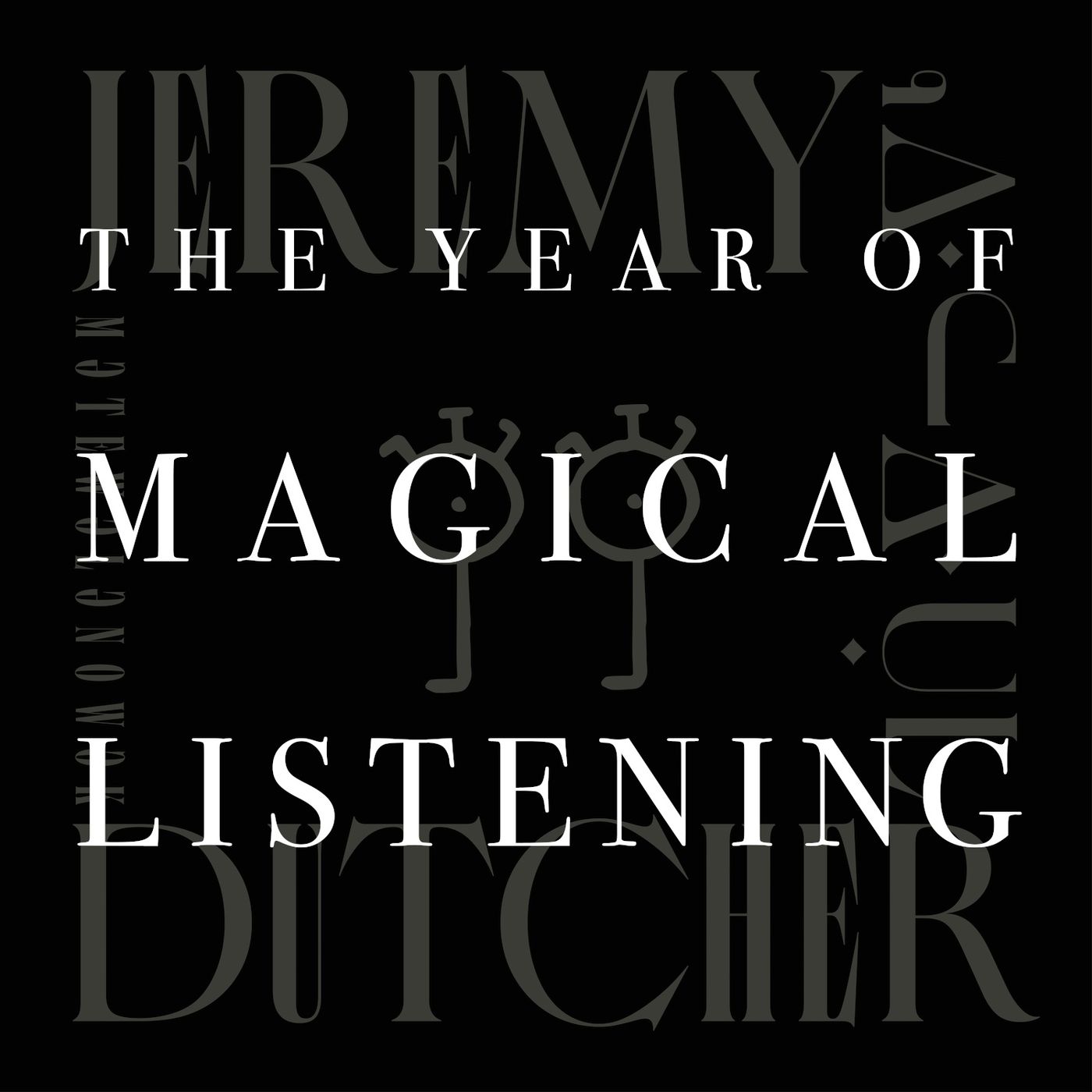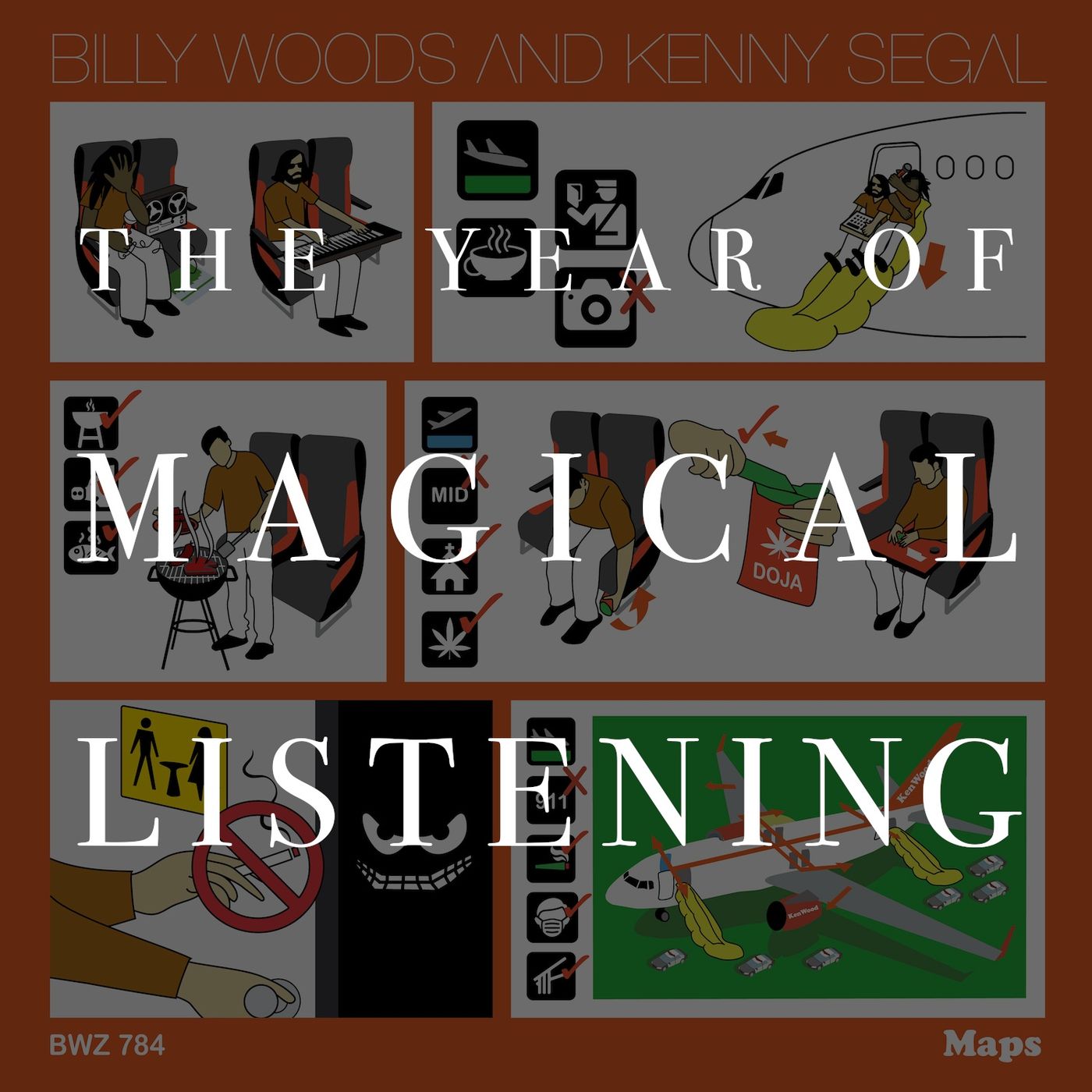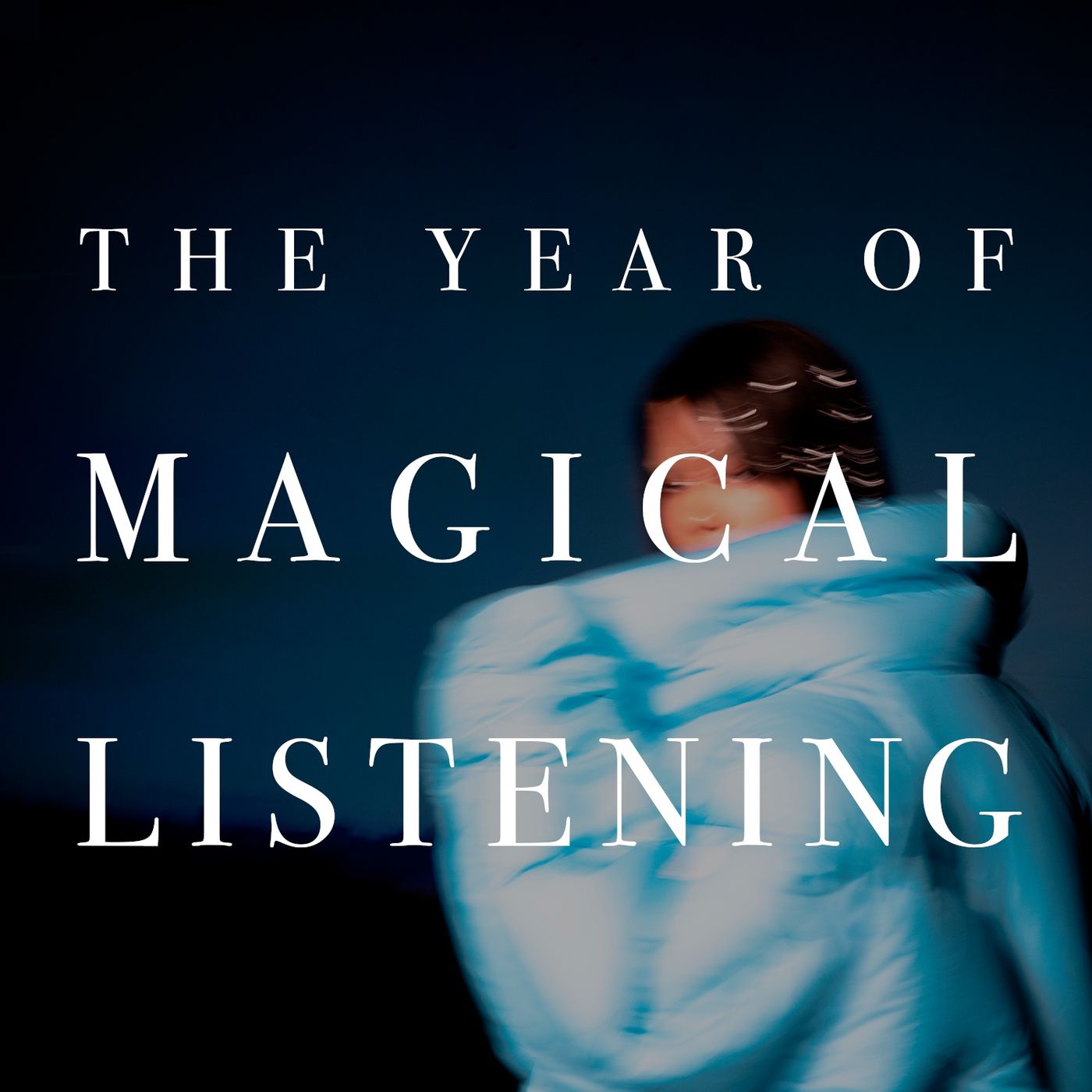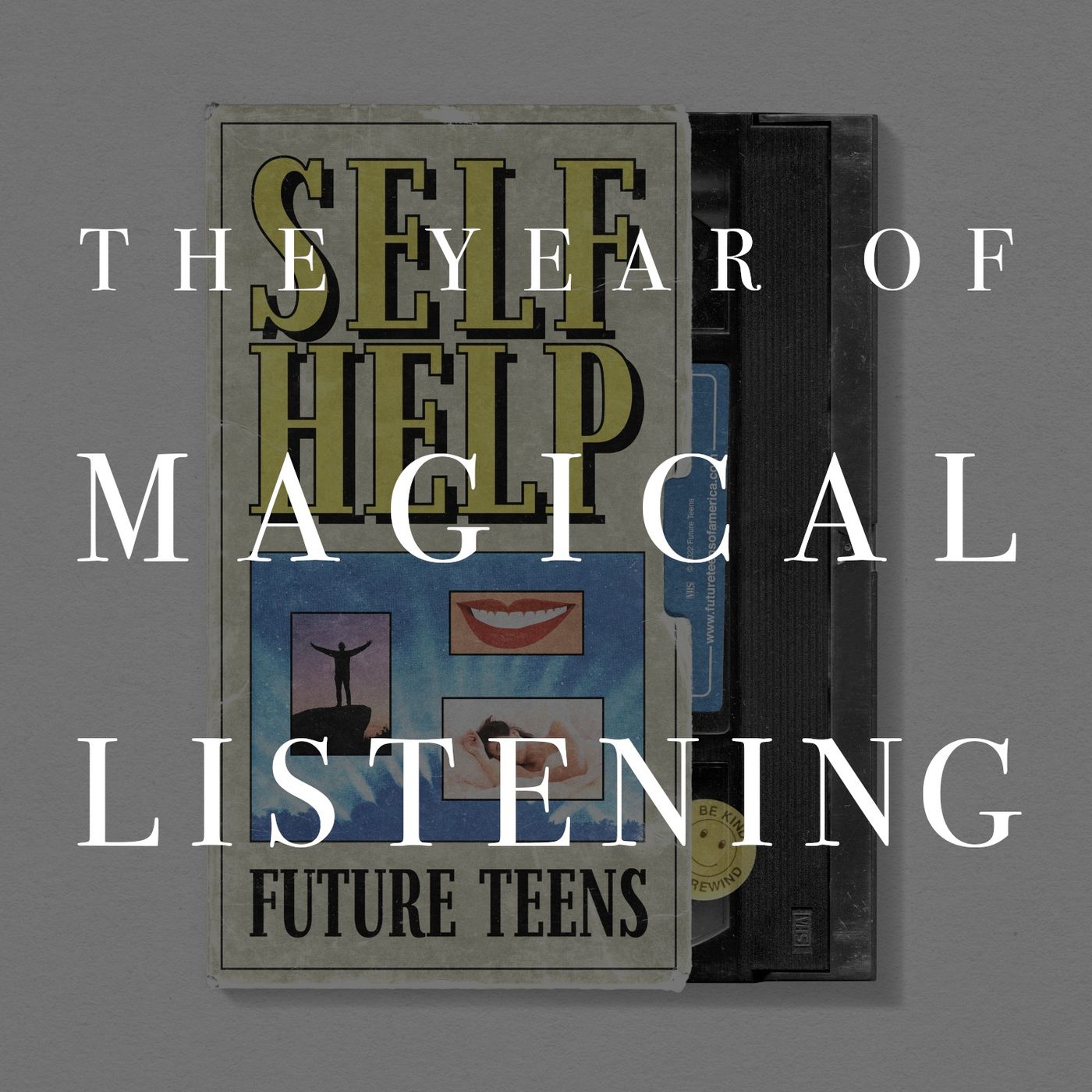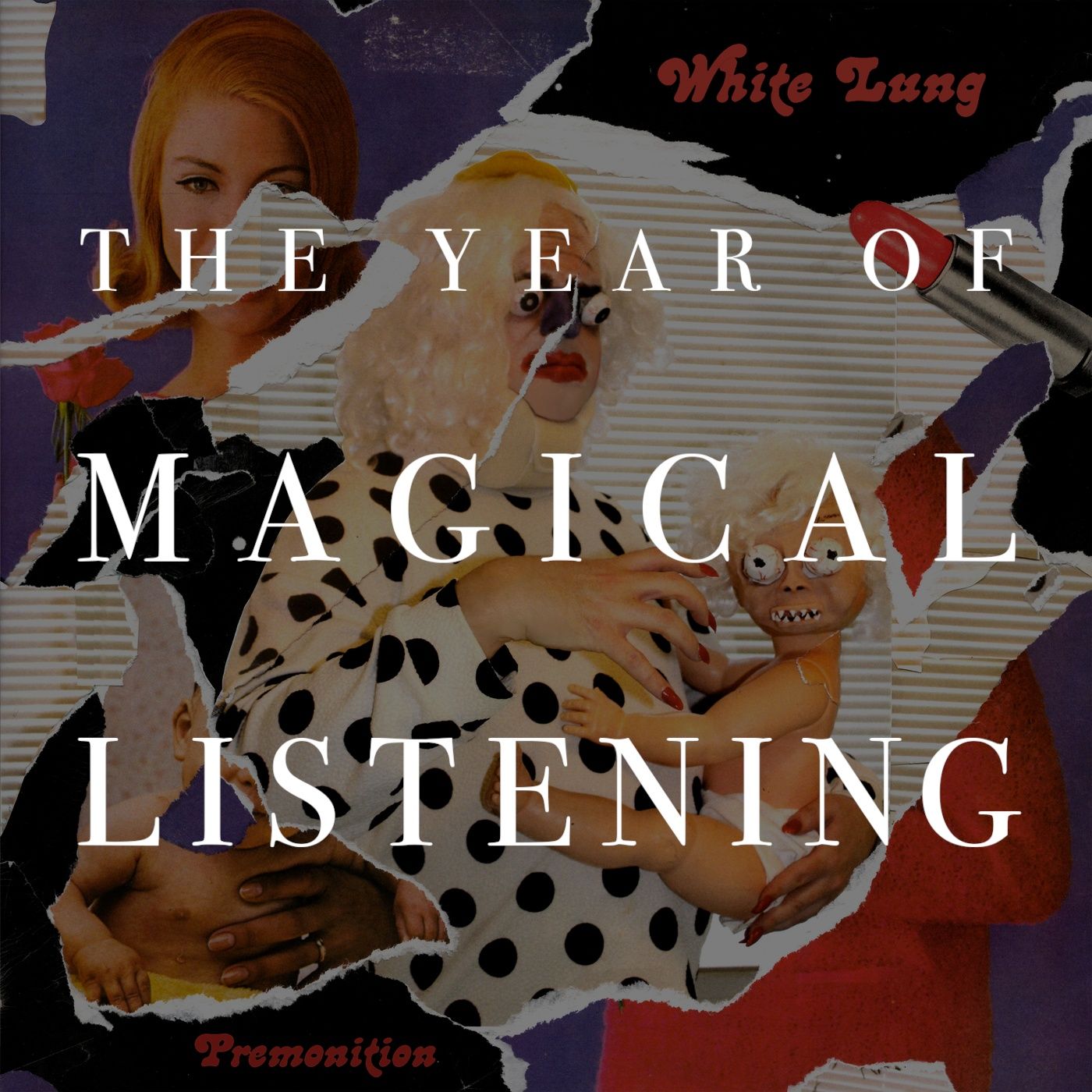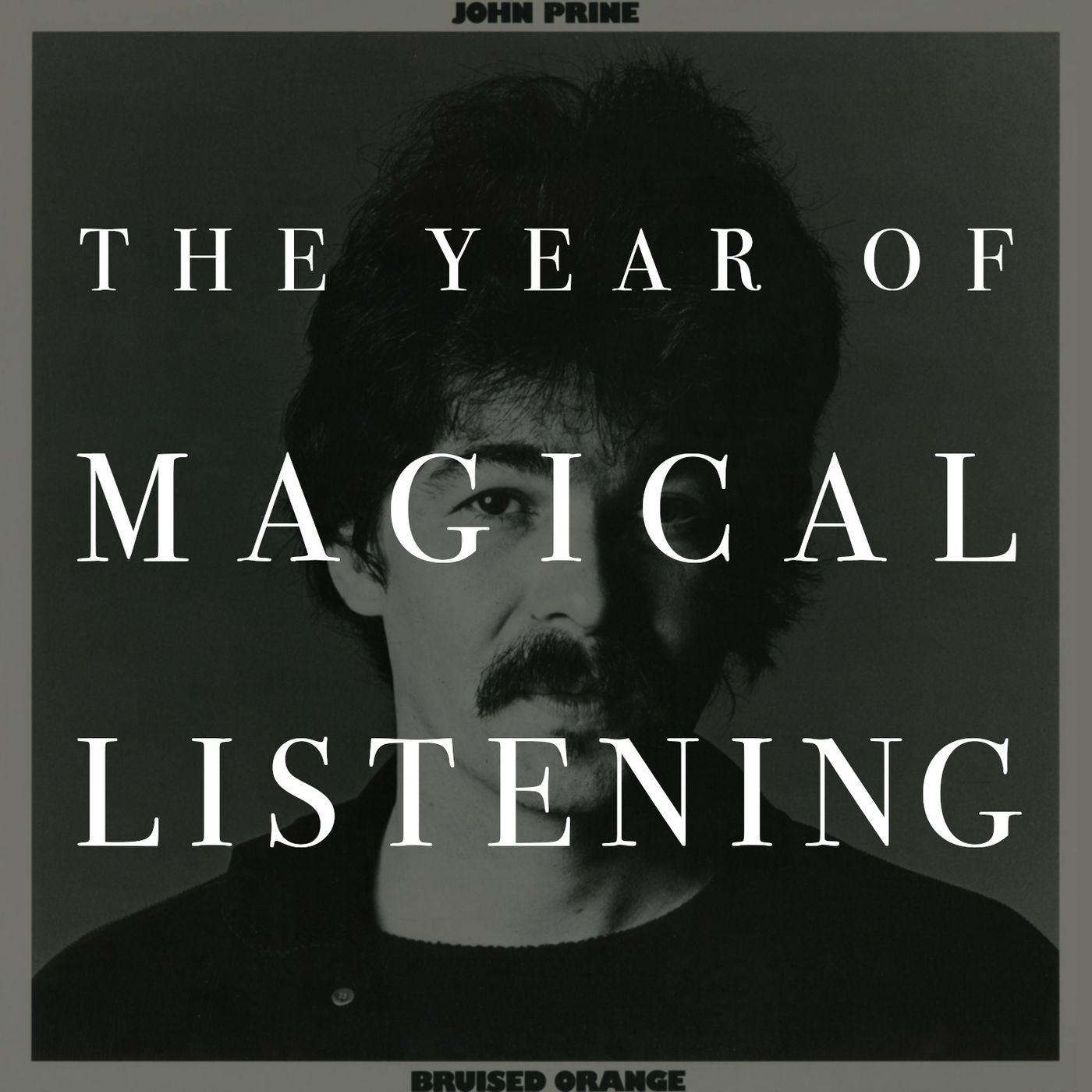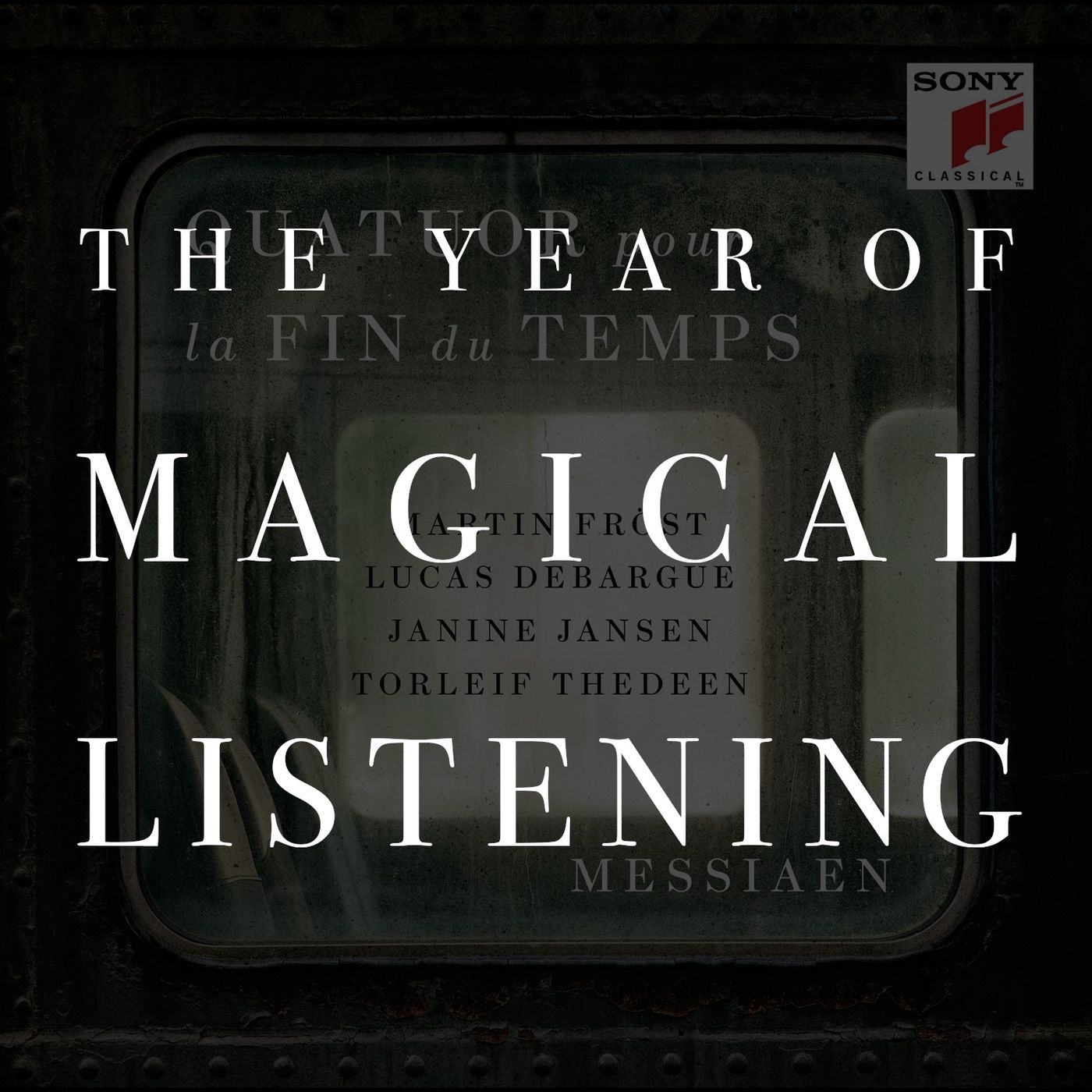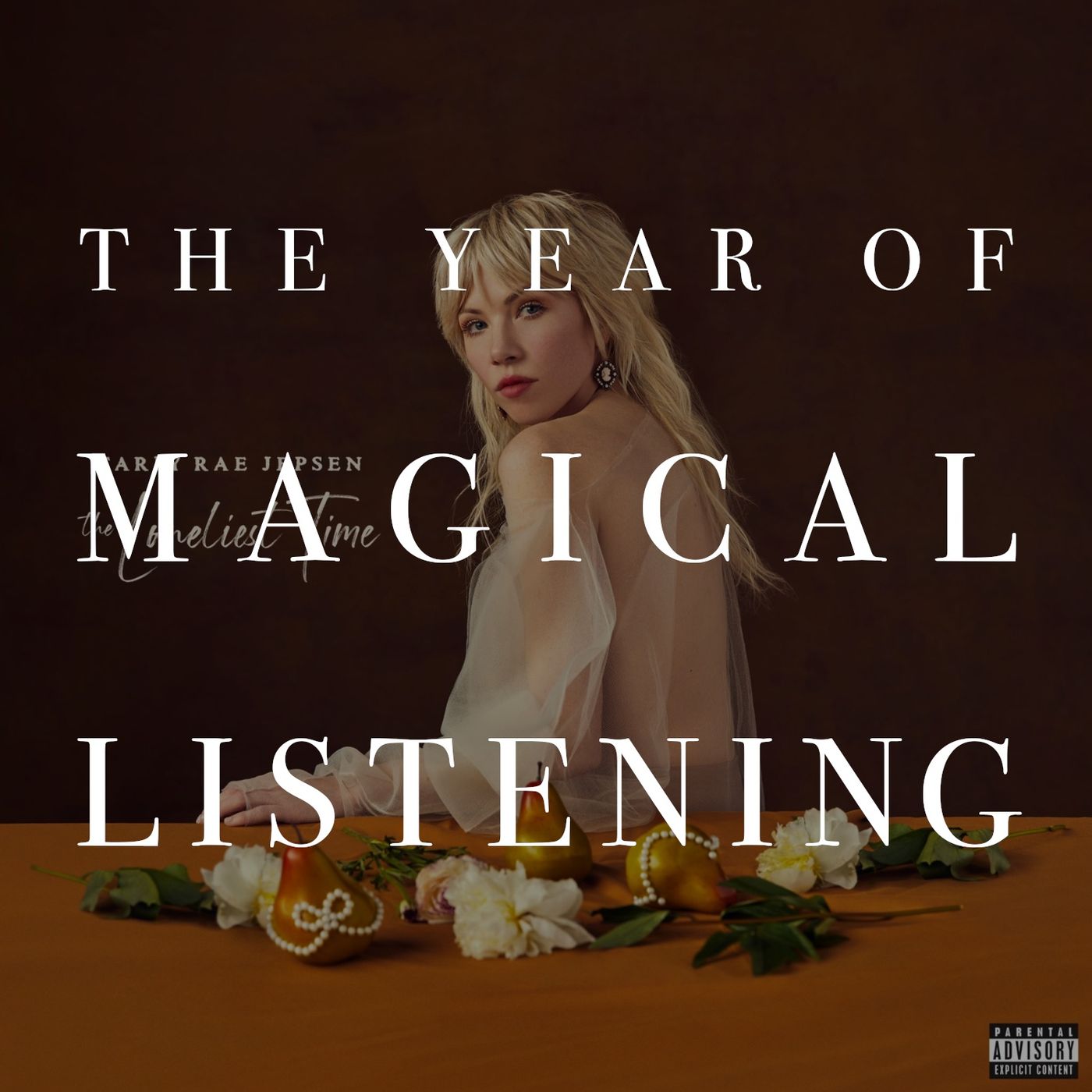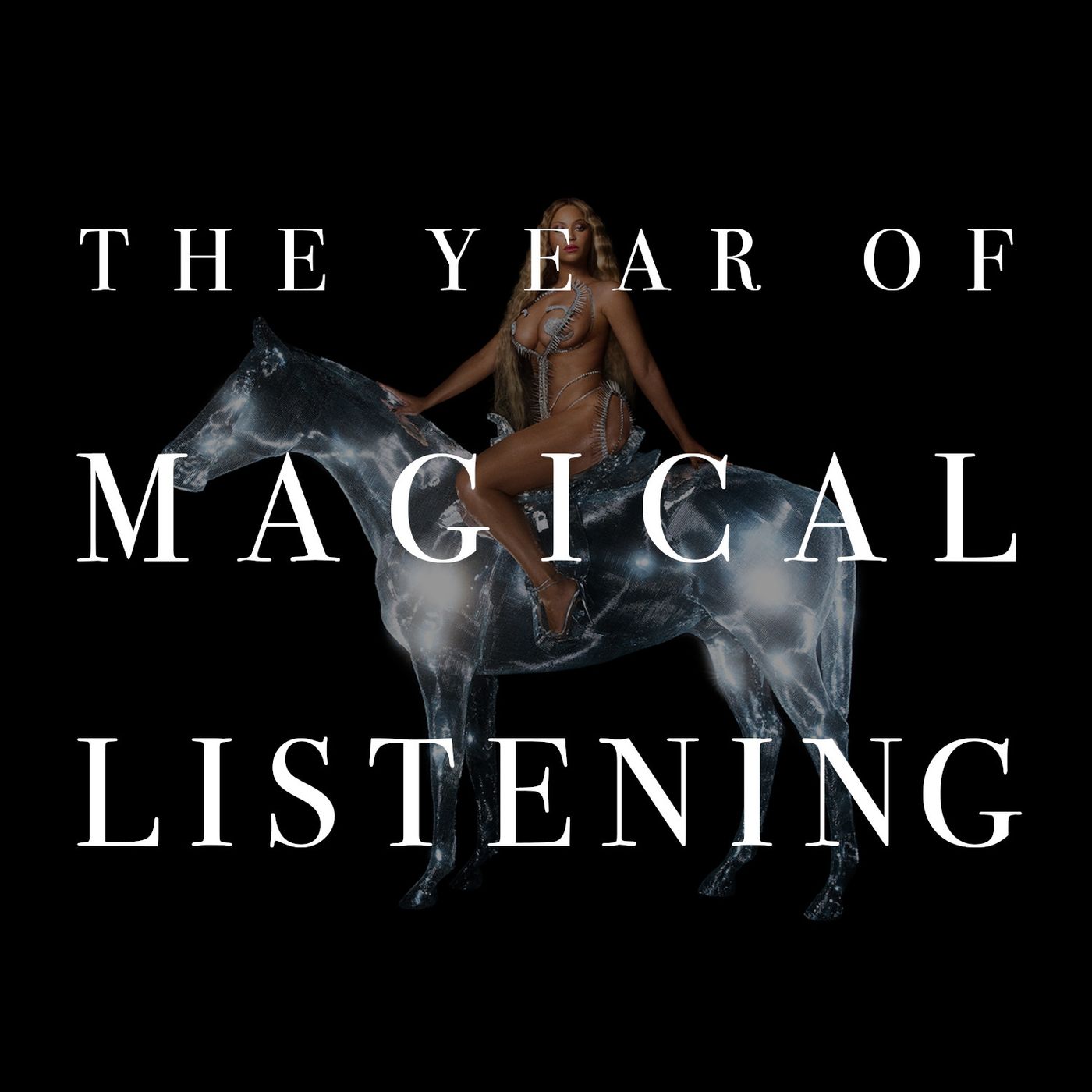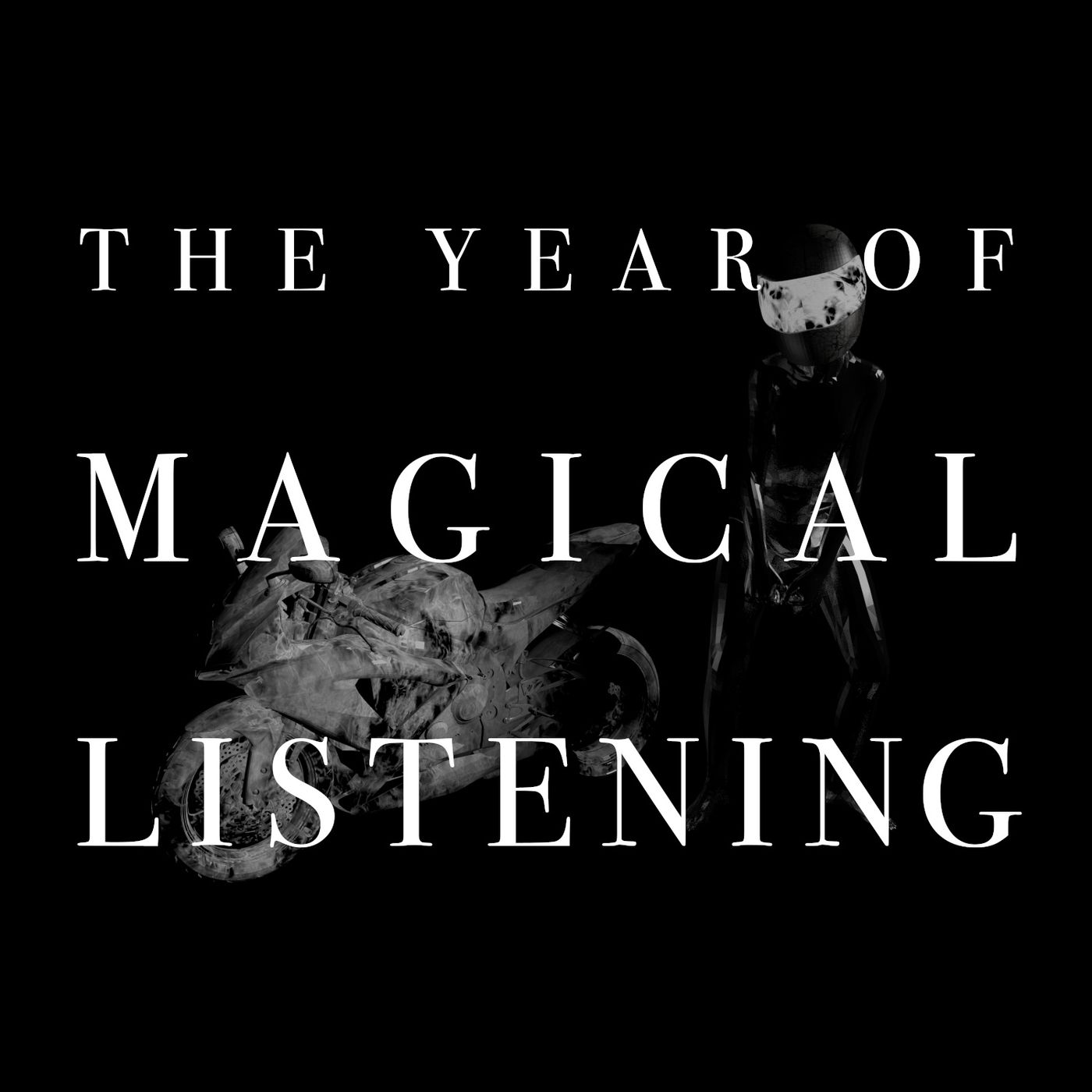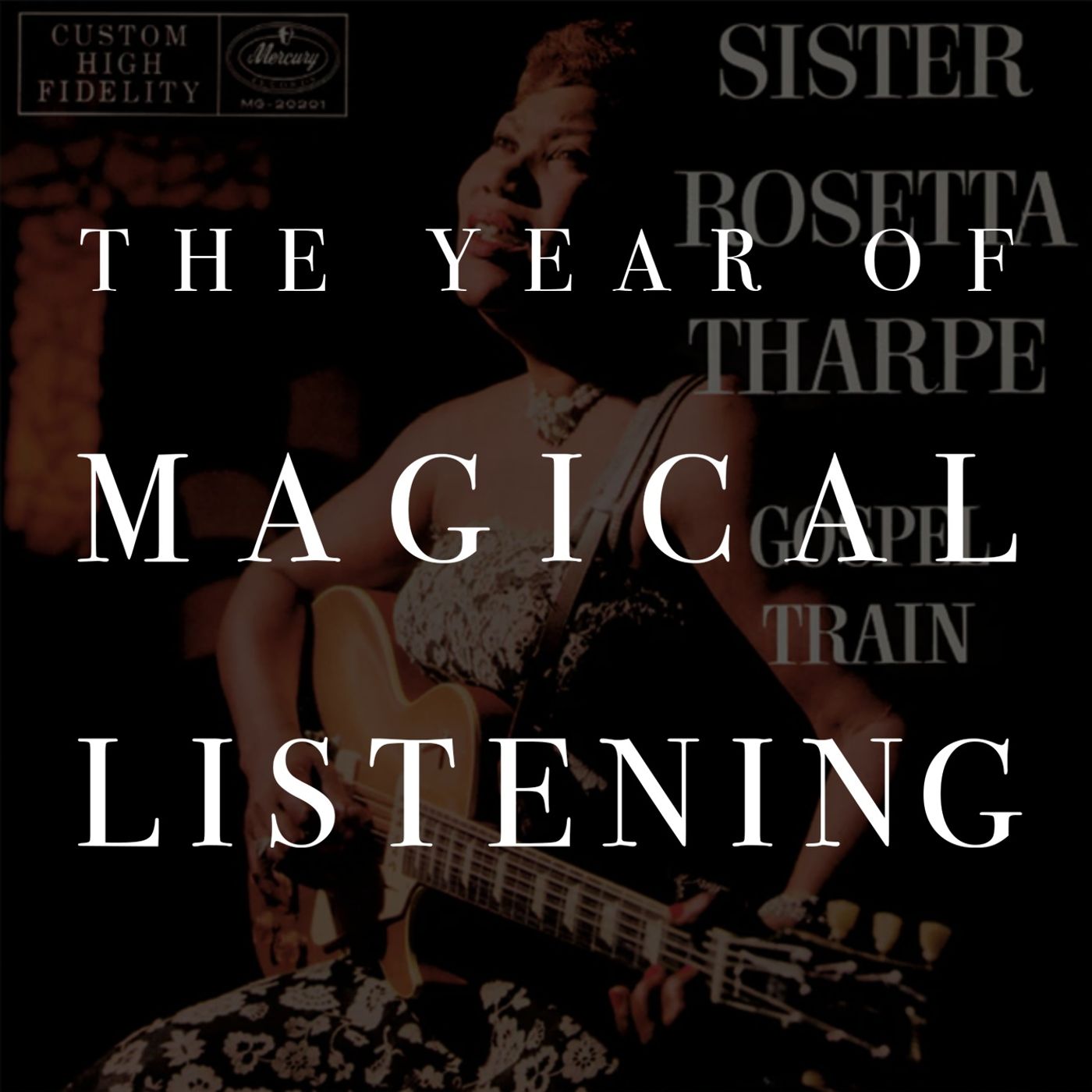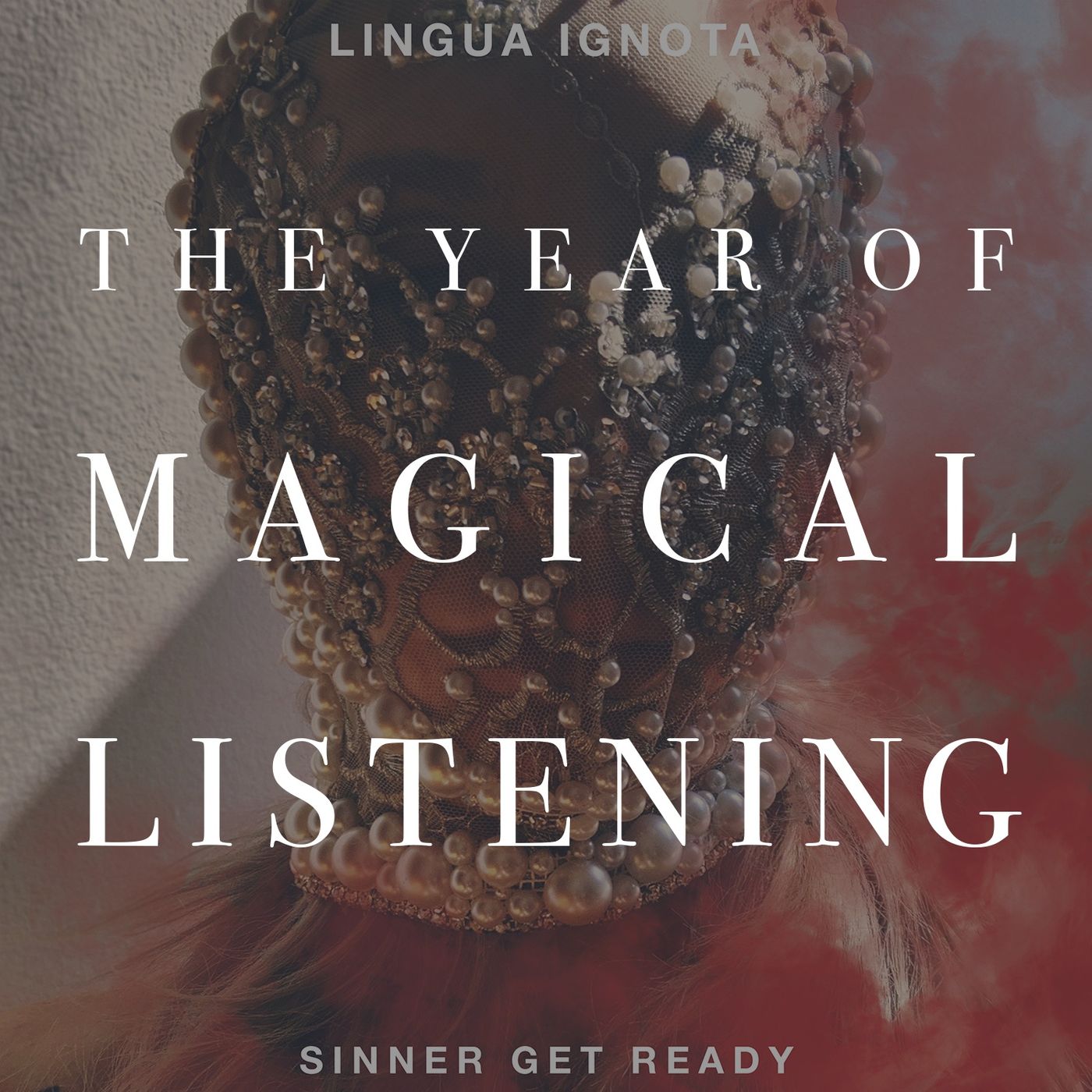Discover The Year of Magical Listening
The Year of Magical Listening

30 Episodes
Reverse
FEATURING KNOWER FOREVER by KNOWER, self-released in 2023. Listen / Buy direct "Knower Forever" "Do Hot Girls Like Chords?" "It Will Get Real" "I'm The President" TRANSCRIPT I'm ashamed to say it now, but I didn't think I liked this music at first. I resisted it, even. It seemed, to put it simply, too much. And by the way, this music, what's playing right now: it's nothing like the rest of the album. It's nothing like the songs I actually want to talk about. Then again, no song on this album is like the rest of the album. If there's one constant to this music, it's a refusal to stay in any one place. So maybe this, a sumptuous orchestral overture, is the most fitting introduction to an album that never ceases to subvert our expectations – like this. See what I mean when I said that this music seemed like too much? What do you even do with a riff like this? It's so intense and sludgy and just kind of dumb, that it's hard to know whether it's meant in earnest or in jest. But one thing's for sure: the band is playing the heck out of it. And then the song flips on its head, opening up into these bright jazzy harmonies and pillowy synth pads, layered on top of an absolutely killer bass line. It's so ridiculously groovy, it almost feels like a joke, like a spoof of a jam band. And the lyrics don't make things seem any the more serious, being just a list of things that the singer "[is] thinking while you are talking", like "does purgatory have snacks?" and "do hot girls like chords?". But just as the band has us thinking that they're just goofing around, out comes this explosive solo, which is no joke. This is some seriously sick shredding. It's moving faster than I can even hear it. It's the sort of virtuosity that puts a grimace on your face, that feels like it's bringing us to the bleeding edge of what music can be. This is music on overdrive, music that exists to be over the top, music that wants to show us that it can do anything. So perhaps it's no surprise that this next song is something totally different, a sweet, singsong melody addressed to none other than Death. "Hey Grim Reap", sings the singer, as the keys chime in with a syncopated house rhythm and the band gets ready to move. And then, with the verse, the band pulls back, the drums subdividing the beat into almost infinitesimal segments, with the keys and the bass interjecting in a playful unison. I don't know if this is the band doing hyperpop or glitch or chiptune, but whatever it is, it's never grooved so hard. This is music that relishes in being stylistically all over the map, but if it has one consistent quality, it's an aesthetic of flexing, of showing that it can take any musical idea, no matter how wacky or crude, and make it sound like the coolest thing you've ever heard, just by sheer force of musical will. But let's go even bigger. And what's bigger than a punchy bass line? How about a bass line played by a full brass section? How about a song about what it's like to be the President? Yet again, this music is a ludicrous mash-up. The singer's mellifluous voice is paired with impish lyrics, as funky rhythms are punctuated by grandiose fanfares. And then, without missing a beat, the band transitions into this harmonically dense pre-chorus. Has anything this tongue-in-cheek ever sounded so nice? This is the band at their purest and most irreverent. It's audacious and bombastic and larger than life – kind of like a certain you-know-who. This band feels to me like the trickster gods of acid jazz, using their musical omnipotence not for good nor evil but rather for play – to shake us out of our musical conventions and show us that true virtuosity knows no bounds. After all, if you're this talented as musicians, why not use your powers to have a little fun? So let's all rise and hail these musicians and send them off with one final, epic salute.
FEATURING "Free From the Guillotine" by Ryan Davis & the Roadhouse Band, from Dancing on the Edge, released by Sophomore Lounge in 2023. Listen / Buy direct TRANSCRIPT I want to do something that's not easy for me to do on this show: I want to talk about an artist who's first and foremost a lyricist. Which means I will be talking over the very lyrics I want to highlight. It ain't gonna be pretty – but hey, life isn't always a walk in the park now, is it? What a perfect opening couplet. Someone in the singer's life just "got a new tattoo of an old tattoo". A friend, or an acquaintance, or maybe a stranger – but at any rate, someone wanting more of the same, or perhaps nostalgic for the past. The singer, meanwhile, and in contrast, has been restless, as they've "hunted and hunted for the dreams [they] thought [they] wanted". It may seem like no more than an offhand observation, but it sets the stage for the rest of the song, which finds the singer again and again sitting on the edge of their community and wondering if now might be the time to jump off. The song is filled with these gem-like, off-kilter aphorisms – wry turns of phrase that always get at something deeper, in the way that only metaphor can, like "we are busted stitches in the patchwork of the flag" or "I'm doing 25-to-life just waiting on a friend to get back from a piss". How better to encapsulate those twin feelings of unbelonging and captivity, of alienation and familiarity? You can almost see the singer leaning over a bar, looking out at the crowd and contemplating that next round, wishing for something different, while for the moment having nowhere else to be. But I don't want to be too reductive here. I don't want to suggest that these lyrics mean any one thing. The language is figurative, not literal, and that means it's less about what the lyrics are saying and more about all the things they bring to mind. It's about that free play of the imagination that such imagery stirs up inside us. And that's why, I suppose, the song feels to me at its best when it's at its most enigmatic and gnomic. Like what does that mean – "a negligible fraction of the holy trinity"? I love it, but not because I can decipher it. I love it for all the associations it conjures up – of cosmic insignificance, of a fall from grace, but also of the divinity still within us. In a word, it's poetry. And that brings us to the song's leading image: "to be free from the guillotine" – another resonant metaphor, suggestive of so much: the sharp bite of social ostracism, the spectre of retribution, and the shining promise of liberation on the other side. But the singer is always quick to undercut their own triumphalism. They're breaking free, sure, but they're not quite there yet. As they put it: I'm here halfway through at best With no clear pathway through the rest Playing contract tambourine in a shipyard plumber's band The singer doesn't know where they're headed; they just know that they've gotta go, and that they're gonna ruffle some feathers along the way, becoming "a willingly endangered bird of prey". It all feels so relatable, even if I'd never think to put it in precisely these words. It's that feeling you get when you recognize that you need to get out, to turn your back on the world you've known and make a better life for yourself, even though you have no idea what that life will be. And it's here that the song's persistent specificity starts to dilate and expand. The singer isn't just singing about themselves; they're singing about all of us – about the fixes we've all been in, the doubts that've held us there, and the dreams we're all hunting of finally being free.
FEATURING "Fairytale of New York" by The Pogues featuring Kirsty MacColl, from If I Should Fall from Grace with God released by Warner Music in 1988. Listen TRANSCRIPT Here's another one that fell through the cracks, another song I have no right not to have heard until now. And I couldn't even get to it in time for Christmas. But like the song's narrator, let's pretend that it's an earlier time and take this as an opportunity to reminisce on Christmases past, on better and worse years, and on dreams once held. If you, like me, are new to this song, it's a parable in three acts, the story of a couple of immigrant kids finding their way to New York City and each other. And it begins here, in the way young love often does, with tenderness and hope, a feeling that makes everything seem ready to burst open with excitement and anticipation. The song seems to understand so much about life, like how falling in love with a person often coincides with falling in love with a place. Or how nothing makes a new place feel more like home than coming across a piece of where you came from, like seeing the local police choir singing an old Irish tune. But the song also understands that new love never stays so pretty, and in its second act it shows how quickly those initial feelings of jubilation can sour, as the young lovers viciously bicker back and forth. And there it is again, that reminder of where they came from, now seeming like a symbol of the inescapability of who they were and still are. So how does it all end? In a word, ambivalently. Our lovers are civil again, but not without grievance. Because the song understands that the most powerful relationships in our lives are never simply one thing, but those where tenderness exists alongside bitterness, where the things we cherish most dearly are also those that break our heart. It's no fairytale romance, but it's all the more poignant because of that. It's no cheery Christmas carol, but it's none the lesser for it. And the song itself is no pristine composition, either; it's imperfect, and weird, and rough around the edges. But that's precisely what makes it so affecting. It's a celebration of life in all its messiness and complexity, and what better to celebrate on Christmas Day than that.
FEATURING "Psychedelic Switch" by Carly Rae Jepsen, from The Loveliest Time, released by 604 Records in 2023. Listen TRANSCRIPT This is an ode to my song of the year – the song I played more times than any other song, and that played in my head countless more times than that – a perfect song, an electric song, an unstoppable, irresistible song that never failed to sweep me up and carry me away. This song's pleasures are immediate and undeniable. But like the last time I talked about this artist, we must be careful not to overthink this music. Because what it's really about is that feeling that it stirs up inside us – that euphoria, that release, that palpable satisfaction. This isn't music to analyze; it's music that's here to make us dance and laugh and throw all our other cares away. But there is, I believe, a little more to this song, and so at the risk of flouting my own advice, I'm going to overthink it a bit. Because I do think this song is telling us something, or at least discloses it by the by amidst its revelry and exuberance. On its surface, this is a song about the transformative power of love: its capacity to act as a "psychedelic switch", to flip our minds into a new mode and change the very way we see the world, such that all our prior worries dissipate in the face of this new feeling. But this song is also unmistakeably a song about the transformative power of music, and its capacity to act upon us in precisely the same way. More than any other art form, music has the ability to lift our spirits in an instant. More than any other art form, the experience of music can be as euphoric and intoxicating as the experience of love. More than any other art form, music can even be indistinguishable from our emotions themselves. Like the singer says, they were "a sad, sad song" before. But now, with this song, it's like a psychedelic switch. And what is it like to be in such a beatific state? The singer sums it up in a single lyric: they'd be "satisfied forever with a couple of years of this". Like love, music doesn't need to be timeless to be worthwhile or meaningful or even life-changing. Some of the most important pleasures we feel are ephemeral ones. And music doesn't let us forget that, because music, in the best cases, makes us feel it. So here's to my song of the year, which even if it's just for this year and no others, is more than enough to keep me satisfied forever.
FEATURING Motewolonuwok by Jeremy Dutcher, released by Secret City Records in 2023. Listen / Buy direct (digital | physical) "Skicinuwihkuk"TRANSCRIPT The first sounds we hear are the music of nature: the harmonies of birdsong, the rhythm of the land underfoot. The next sounds we hear are the music of language: poetic speech in a seldom-heard tongue. It's like an invocation of the music that is always everywhere all around us, if only we learn to listen, even if we don't understand.And so begins the music proper, which feels like an invocation of a different kind, an invocation of the magical power inherent in sound, that's always there just waiting for a maestro to pick up the right threads and weave them together and make something beautiful that shakes us to the core.It's often said that music transcends language, and that's certainly the case here. I, at least, do not understand this music's lyrics, but that does not at all stop me from recognizing the pathos in these words. Yet something deeper is also going on. It must be said that this music is sung in a language whose living speakers number only in the hundreds – an "endangered" language, which is to say, a language that has historically been persecuted and suppressed and is now being intentionally revived and carried forward. In singing in this language, the artist isn't just translating it into a medium that all can understand and feel; they are breathing life into the language itself.And just as the language is animated by this music, the music is animated by this language, giving birth to a musical idiom all its own, melding the contemporary with the classical, the anthemic with the intimate, and the rousing with the hypnotic. It's a performance that's positively brimming with life, leaving us to wonder at what other music there must be in sounds yet unheard, in songs yet unsung, in words yet unspoken, and in acts yet undone.
FEATURING "Solo for Tamburium" by Catherine Christer Hennix, composed and performed for MaerzMuzik in 2017, and released by Blank Forms Editions in 2023. Listen / Buy direct TRANSCRIPT A constellation of notes slowly comes into view, filling up the night sky with light. From darkness comes illumination; from silence comes reverberation; from nothing comes, seemingly, everything – every pitch, every harmony, every resonance, all at once. We are abruptly thrown into a swirling cosmos of sound, surrounded by an unfamiliar polyphony. We are momentarily lost in a foreign musical landscape, unmoored from the customary landmarks of melody, rhythm, and thematic development. And then, with time, we are gradually transformed, as this music works its magic upon us, bringing us into its mesmerizing world, inducting us into its greater mysteries, elevating us to its astral plane, and allowing us to come in contact with its musica universalis, the harmony of the spheres. In the common parlance of musical typology, this piece would most commonly be labelled as "minimalist", for how it eschews music's conventional variety of timbres, textures, dynamics, and themes. But for all its minimalism, this piece feels like it contains everything within it and encompasses the totality of harmonic space. It would seem just as appropriate to label it "maximalist". And fittingly, for all that this music feels utterly unique, it was not in fact fashioned ex nihilo. It speaks a new, distinctive vernacular, but it's a vernacular in conversation with other, well established traditions, like the Indian raga and the Arabic maqam. It is played on a new, synthetic instrument, but it's an instrument that was constructed entirely out of other, acoustic instruments, meticulously sampled so that they could be reworked, recombined, and replayed. It's like this music was already there, in potentia, in these other sounds, just waiting to be discovered, a shimmering universe hidden within. The piece will go on like this for seventy-eight minutes, but seventy-eight minutes doesn't feel like its true length. It doesn't really have a beginning, middle, and end. It fades in at its start and fades out at its close, as if the piece in fact goes on forever, and we are just catching a glimpse as it passes us by, like a satellite crossing the heavens. And so it continues, slowly unspooling and imperceptibly changing, deepening and expanding but staying fundamentally the same. The piece will go on like this for seventy-eight minutes, but what strikes me most about this music is how it seems in every instant to be self-contained, as if it doesn't need to play out over time at all, as if every moment holds within it the potentiality of every other moment, like a musical fractal geometry, infinitely repeating no matter how far you go in. It is music that is in time, but not of it; music without any essential duration; music that transcends the temporal dimension; and music that lifts us out of time as well, to share in its eternal present. It is music that recalls that line from William Blake, showing us what it's like to: Hold Infinity in the palm of your hand And Eternity in an hour The piece will go on like this for seventy-eight minutes, but by the time we finally reach that point that number will lose its meaning. It will feel like we've been listening for all of time and for no time at all. Because infinity cannot be contained in any length of time, and thus is equally imperfectly contained in all of them. We may never be able to truly comprehend this music; like infinity, it's too much for us finite beings to take in. But we can listen and allow ourselves to be in its presence, to let our sense of time dilate and our consciousness expand as everything else evaporates into the ether and only this music, in its limitless potential, remains.
FEATURING Javelin by Sufjan Stevens, released by Asthmatic Kitty in 2023. Listen / Buy direct "Will Anybody Ever Love Me?" TRANSCRIPT The first thing I noticed was how familiar it all felt: this fingerpicking, these harmonies, this dear little voice. And more than that, the distinctive flood of emotions that was instantly stirred up inside me. This music felt – and still feels – like reuniting with an old friend, or revisiting an old home, or catching sight of an old lover, or recalling a loved one now lost – a resurgence of suppressed feelings and memories, suddenly foisted upon you. I've been listening to this songwriter for nearly twenty years; I can no longer imagine what it's like to hear them for the first time. I can only experience this music as a return, to a place of unbridled emotional vulnerability, that place this songwriter has brought me to so many times before. Though I'll admit, it is not somewhere I always wish to return. The thing about these songs is that they can almost be too tender, too fragile; and a heart can only endure so much ache. Listening to this music is like staring at the sun, a direct confrontation with the strongest and rawest of our feelings, feelings we typically don't dare to express. It can be tempting to avert one's eyes. But it can also be gratifying to be reminded of this capacity within us to hurt and to long deeply. In a way, this music is more honest with ourselves than we are, letting us feel what we so often don't allow ourselves to feel. Every time this songwriter comes to us with more of these songs, it's like a reaffirmation of life's true emotional weight – how it can wreck us, how it can humble us, and how it can, occasionally, show us grace. It is not a place we can bear to remain for too long, but it is comforting to allow ourselves to be held here for a moment, in the songwriter's delicate embrace.
FEATURING Fountain Baby by Amaarae, released by Interscope Records in 2023. Listen / Buy direct "All My Love" "Angels in Tibet" "Co-Star" TRANSCRIPT I loved this music from the moment I heard it, from the very first notes of its opening melody, with its haunting oscillation between dominant and tonic, and this ghostly choir of distant voices gradually surfacing amid a groundswell of strings. And I'll admit, I can't quite say what it is about this music that enthralled me so immediately, or what strange magic flows within these sounds, but I knew, instinctively, from the moment I heard it, that this would be music like nothing I'd ever heard before. This song throws so much at you all at once, it's hard to know where to begin, but let's start with the rhythm. The beat is all syncopation, hitting hard on the one and then subdividing the rest of each measure in a mix of threes and fours. It's urgent and aggressive and unrelenting, like waves crashing down on you while you try to gasp for air. Then there's the percussion, which forgoes the typical pop and sizzle of snares and hi-hats in favour of an ensemble of pitched drums and rimshots, lending an acoustic warmth and energy to a song that is otherwise a club banger. But what we really need to talk about is this voice: this whispery soprano that, for all its delicacy, stands toe to toe with the drumline and somehow commands the whole performance. It's not at all what you'd expect, especially for a song that's so raw and raunchy, with such memorable lines as "I want to fuck a puddle" and "I'll Lindsay a Lohan". But that's the beauty and the genius of this song. It's absolutely singular in its sound, and it all works because it says it works, because it fully commits to being fully itself, and because it knows that it's an unstoppable force of nature. And like nature itself, it can change in a flash, turning from a downpour into a drizzle, as light as raindrops bouncing off your skin. Now, everything feels playful and buoyant, as bouncy as the bass synth and as feathery as the harp's arpeggios. The music has metamorphosed from a heavy rain into a misty vapour, while somehow remaining, in its essence, the same. This is a multitudinous music – music that can, at one moment, inundate and overpower, and then, in the next, refresh and rejuvenate. And that's why it's so fitting that the overarching metaphor of this record is water, in all its elemental guises. It floods and it cools. It drowns and it hydrates. It makes waves and cuts canyons. It gives life and brings death. It's the sweat on your chest and the shower on your face. It's a symbol of tranquility and a symbol of devastation. It's a symbol of arousal and a symbol of rebirth. And all the same could be said about this music. It overwhelms, it revitalizes, it makes us wet. It's an unending stream of musical styles and ideas, cycling between countless different forms and textures, swelling and receding, ebbing and flowing, spilling over in abundance, and ultimately leaving us to float on its endless fathomless sea.
FEATURING Maps by billy woods and Kenny Segal, released by Backwoodz Studioz in 2023. Listen / Buy direct"Soft Landing""The Layover""FaceTime""NYC Tapwater"TRANSCRIPT Here's a little secret: When I listen to music, the lyrics are typically what I hear last. I am drawn to the sounds and harmonies and rhythms; but the words often pass me by. Which may make a lyrical genre like hip-hop seem like it'd be a nonstarter for me. But of course it isn't; for how could you pass up music like this? Though actually, maybe hip-hop is an easy sell for a listener like me, because hip-hop is about so much more than the literal words. Even before you can make out a single lyric, you can feel what this music is expressing. It's in the MC's voice, with its sure-footed delivery and breathless flow. It's in the DJ's production, with its languid boom-bap and far-off horns like sirens. It's tuned every aspect of its sound to create a feeling that is at once laid-back and confident and filled with a sense of underlying dread. And what could be more musical than that? But this isn't just music that you can vibe to. This is lyrical music at the end of the day, and it's in its words that it truly distinguishes itself. Its verses are densely packed poetry, and even before you can start parsing their content, you can luxuriate in the pure sound of the language – the effortless flurry of assonant syllables ricocheting off each other in syncopated slant rhymes and the way each phrase seems to fall out in a natural rhythm as it rolls off the tongue. The words just sound good, independent of what they mean or what they're being used to say, showcasing the musicality that's always there in language, just waiting for someone to coax it out. Or maybe this is just me, continuing to avoid actually hearing the lyrics, and picking up on every other musical element instead. Not that the MC makes it easy to follow along. Even with a lyric sheet out in front of you, it can be hard to decipher what's being said. Lines shift between perspectives and timeframes and locales, feeling less like a sequential narrative and more like a stream of consciousness, a pastiche of vivid images flashing before the mind's eye: The sunset in the desert... I sip Mexico's best slow... Unbroken wild ponies... Only the lonely big tree like a sundial But the fragmentary quality of the lyrics is by design. Because if this record is about anything, it's about being on the road – and not just in the sense of living an itinerant lifestyle, but more deeply in the sense of the state of mind that that life puts you in: how the continuous bombardment of unfamiliar sights and sounds can make you turn inward and how the constant movement from one place to another can end up grounding you in where you're from. That's why we find the MC, in the middle of a crowded party... Smoking alone in a cardigan Thinking of home It's that feeling of double consciousness, of being physically in one place while being mentally in another, of being uncommonly receptive to the world around you while being trapped in your own thoughts and interiority, of being on the road while feeling like you've never left. It's a vibe, to be sure, but more than its particular vibe, what I appreciate most about this music is the power of its language: its specificity, its creativity, its evocative nature. Even when I'm only catching passing glances of the lyrics as they zip by, I feel transported by the potency of the imagery. These are words that you can see, taste, and smell. The MC isn't just telling us about being on the road; they're bringing us along for the ride. But all odysseys must come to an end. And so, in this last song, the MC returns home – but as they take in the sights of their New York City streets, nothing is how they remember it. All they see are new people, new buildings, new shops, new goods – and all they can think of is how things used to be. As they say, "I'm home, but my mind be wandering off." Because home isn't a place you can actually go back to, or rather, home is only a place you can go back to in your mind. And really, this is how we've been travelling all along. It's not about the places we go; it's about where those places take us – the thoughts they occasion, the memories they bring up, the way they direct and divert our attention, and the poetry they help us see in the world around us.
FEATURING Nymph by Shygirl, released by Because Music in 2022. Listen / Buy direct"Woe""Wildfire""Firefly""Coochie (a bedtime story)"TRANSCRIPT The music starts, and we are immediately surrounded by voices: oohs and aahs and scrambled chatter. It's like we've stepped inside the artist's mind and are about to discover what's there. And when we arrive we are greeted by even more voices: a cooing baby, a smoky alto, a menacing guttural rattle. Then the voices start to swirl together, coalescing into an uneasy unison. The reverb feels endless, as the voices envelop us in their echoing chorus. It's a sound that's like a dream, or rather, like the liminal space between sleep and waking, or the hazy hours at the end of a long night, those times when our thoughts begin to flicker in and out of consciousness and our sense of self starts to dissolve into the world around us. If we've stepped inside the artist's mind, that mind has thus far only proven to be elusive, and we still have no idea of who this artist is. And in case there were any question, this next song will not make the matter any clearer. Now the vocals themselves are warped and twisted, transformed into an unsteady warble. Instead of a kaleidoscopic medley of different voices, we have a single voice that's been splintered and shattered – like a broken mirror, providing only glimpses of the singer looking back at us. The singer even shifts between different kinds of vocal delivery, leaving us guessing as to whether they are singing or rapping or just whispering in our ear. Or maybe the point is that, with this artist, it's always all of the above. What all this creates is a portrait of the artist that is, in effect, a blurry image – which is the perfect, and perhaps the only, way to portray an artist who is constantly shape-shifting and who has no single, stable identity to present. And the music isn't always this same dark tone, either. If only to offer up more complexities and contradictions, the singer shows us that they can also go full-on pop. Here is a melody that is infectiously catchy, bouncy, and upbeat – but to keep us on our toes, it's laid on top of a beat that is punchy, glitchy, and frenetic. And to keep us even more on our toes, the song then turns on a dime, jettisoning everything but the low-end and letting the singer's voice reverberate in the newly open space. But before long, we're glitching back into the matrix, returning to the song's hyperpop chorus yet again. And even though the main vocal is now front and centre and crisp and clear, it is still surrounded by a whirlwind of other voices: high-pitched harmonizations, down-pitched repetitions, chopped up moans and exhalations – little reminders that, even at their poppiest, this singer is never just one thing. And as if to prove the point, the singer shows us that they can also go full-on bubblegum. But of course, the singer is going to subvert these expectations, too, presenting us with a sugary sweet song about, well... Leave it to this artist to take the most carnal of desires and turn it into something that could reasonably pass for a preschool sing-a-long. Leave it to this artist to compose an ode to the female body that is neither lewd nor inane nor even poetic but just fun. And even though you can practically hear the singer winking at us, you also get the impression that they're being completely earnest. Because that's what you get with this artist – a polyphonic persona that's always presenting another side of itself, creating a playground for all the different voices inside their head and showing us, in all their multiplicity, just who they are.
FEATURING "Pretty in Possible" by Caroline Polachek, from Desire, I Want To Turn Into You, released by Sony Music in 2023. Listen / Buy direct TRANSCRIPT You'd never guess it, but this is a song that defies all expectations of what a pop song must be. There's no chorus, or verses really; there's barely any chord changes. But for all that, it's still a bop. We begin a cappella, nothing more than a thumping kick drum, a twitchy hi-hat, and a shimmering, diaphanous voice. And because there's so little else here, we might easily miss that that voice is all over the place. This is no typical melody it's singing; each phrase is different from the last. Musically, this "verse" is more like a jazz solo, a cadenza of virtuosity and melodic inventiveness. And remarkably, this is how the song welcomes us, throwing us head first into its singular, dizzying world. And then, just as quickly, we're thrown back into the conventional world of pop music, back into the easy comfort of a singsong melody, back into the doot-doot-doot of it all. But not for long. For here's yet another variation on our original theme, now adding harmony into the mix. But after a couple of bars that's already enough of that, and we're off to the next variation. For if melody is a series of phrases, which together form the contours of a thought, this melody is a stream of consciousness, jumping from one idea to another, but somehow never losing the conversational thread, and always holding our attention and keeping it rapt. And here now is the closest the song comes to a refrain. And all it is is a single melismatic syllable, followed by a single enigmatic lyric. This isn't the climax you'd expect from a pop song. Which makes it the perfect climax for a song that is never what you expect it to be. Yet for all its unconventionality, this song is still eminently listenable. And for all its melodic gymnastics, it's still melodious and catchy and even, at moments, singable. It truly is a song about possibility: about what it is possible for a pop song to be, and the freedom and the wonder and, indeed, the prettiness that lies in that possibility.
FEATURING Self Help by Future Teens, released by Triple Crown Records in 2022. Listen / Buy direct"Well Enough""Doorknob Confessional"TRANSCRIPTSometimes music helps us realize something about ourselves. And what this music made me realize is that I'm still a sucker for emo pop.We all have our nostalgias, and I guess this is mine. I don't know if this music has universal appeal. I don't know if any music has universal appeal. But for me, this music immediately brings me back to the music of my youth, to those formative works that, for better or worse, first shaped my taste.All the essential elements are here: the hooky melodies, the narrative lyricism, the yearning vocals, the distorted power chords, and an absolute headbanger of a chorus. This just does it for me. I feel like I'm sixteen again, and loving it.And the funny thing is, I didn't even think I liked emo pop anymore. For years I've been thinking of it as a genre I had grown out of: once important, but since surpassed; a guilty pleasure if there ever was one. I don't even much go back to those favourite records of my teenage years, and when I have they've landed differently.Because here's the thing about the emo pop of the late 90s and early 2000s: it's kind of cringe. And that's what I really love about this record: it doesn't just take me back to the glory days of emo pop; it takes what was best about the genre and leaves behind what was worst. It's emo decoupled from the male gaze, from the whiny entitlement, from all the melodrama. But it's still emo through and through: raw but melodic, confessional but anthemic, a cathartic soundtrack to outsize feelings of longing and melancholy.But this music is more than just a throwback. Its version of emo pop is not just more palatable than the emo pop of the past, but also more mature and contemporary. It wasn't just a coincidence that emo pop's original fanbase was awkward teenagers like me. Its emotional preoccupations were those quintessential teenage feelings of unbelonging and unrequited infatuation. And so, what I feel like I've outgrown is not so much emo's musical stylings as its lyrical concerns. The music still speaks to me, but I can no longer relate. And I feel like this band somehow recognized this, and found a way to age emo up by ten or fifteen years, transposing its emotional contours into a more adult, and more millennial, key.Here the emo pop sound is used to chronicle the malaise of early adulthood and its ever-present ennui. Gone are the high dramatics of failed romances and relationships, and in their place are the quotidian struggles of just getting through another day. The tone is still emotional, but the stakes feel more real. These are songs about the hollow allure of self-medication, and the self-destructive tendencies that so often stand in the way of our own mental well-being. These are songs built around lines like "I did nothing but skip another meal and walk around a Target" – because these songs recognize that, at a certain stage of life, this may very well be the most you can say about your day. And the funny thing is, I don't presently relate to these concerns, either. But I can recognize their veracity. What I hear in these songs is that feeling of disillusion that comes with growing up and seeing that this is what adult life looks like. And what I love about these songs is that they serve as a reminder that this experience is just as much a site of emotional intensity as anything we experienced in our youth. And in so doing, these songs expand the emo pop sound and show that it isn't just a teenage phase. If life can still make us feel this way, then music should too.
FEATURING Premonition by White Lung, released by Domino in 2022. Listen / Buy direct"Hysteric""Bird"TRANSCRIPT Some music grabs you from the moment you hear it, and some music grabs you by the throat, doesn't let go, and drags you along with it as it drives itself into the ground.This music is pure energy, blistering intensity, breathless velocity, an unrelenting wall of sound. It exists at just one volume and just one speed; but what it lacks in dynamic contrast it makes up for with its total commitment. This music leaves no doubt as to where it stands or how it wants us to feel. It's a soundtrack to the extremities of emotion, the severity of living, those moments when everything around us seems to be spiralling out of control.It'd be natural to describe this music as "heavy", with all its thrashing and pounding and wailing. But what I'm most struck by in this music is just how weightless it all feels. Everything seems to be floating on air: the effortlessly breakneck drumbeat, the bright and soaring guitar riffs, and the measured vocal melodies that drift and hover above all the chaos below.I'll admit, I don't listen to a lot of punk these days, and I never really did, and perhaps what makes this music land with me is precisely how it veers away from the stereotypical punk sound, offering something more melodic and less abrasive. But in its essence and its ethos, it's as punk as they come. What this music really is is an attitude: the refusal to shy away from your fiercest emotions; the confidence to express them without hesitation or restraint; and the rejection of everything that stands in your way.But if sonically this music is punk without its rougher edges, lyrically it's punk without its headline emotion: it's punk divorced from anger. This music recognizes that the power of this sound needn't only be used as an expression of our rage. Punk music can be used to represent so much more of what we feel, because anger is far from the only emotion that overpowers us, overwhelms us, and makes us want to scream. And what I love about this music is that it takes the punk sound, with all its clamouring intensity, and uses it to channel feelings of maternal love.Because honestly, what could be more terrifying, more maddening, and more world-upending than newfound motherhood? If any experience is inherently worthy of the punk treatment, this is it. Because at bottom, punk is for those emotions that can't be contained, and there's no greater cascade of emotions than a parent's feelings towards their newborn child.What this music shows is that punk, though it may seem like such a youthful genre, isn't a music you age out of. Life will always find ways to make us feel outsize emotions, and we will always need music to give those emotions voice.Fittingly for a song this powerful, it ends with the singer laying down their strongest fears and convictions:One day, we won't be here...You'll hate me, you'll move on...But I won't unlove you...Music may never be able to express these feelings fully, but it can make clear how fully they are felt.
FEATURING Bruised Orange by John Prine, released by Asylum Records in 1978. Listen"That's the Way That the World Goes 'Round""Bruised Orange (Chain of Sorrow)"TRANSCRIPT This artist is no secret. Bob Dylan named them as one of his favourite songwriters. Johnny Cash cited them as one of his few sources of inspiration. Bonnie Raitt called them the next best thing to Mark Twain. But up until a couple months ago, I had never heard any of their songs. And boy, was I ever missing out. I've listened to plenty of other great singer-songwriters before, but still, right away, this one seemed special. There are familiar notes of folk and country here, to be sure, but it all comes together in a way that feels distinctive and refreshing. The lyrics are plainspoken but also whimsical; the vocals have a rough but also delicate edge; the arrangement is soft but also incredibly tight. Overall, the feeling I get is one of confidence and maturity. This is a songwriter who knows exactly what they're doing, and are doing it. So what is this songwriter doing? Well, like any great songwriter (or novelist, or storyteller), they're looking at life and telling it like they see it. That's all this song is, at bottom: a couple slice of life stories, capped off with the moral that "that's the way that the world goes 'round". But the simplicity of this song's design belies the difficulty of actually executing on it. To look at life and see it clearly, and to depict it without sentimentality or cynicism, without preachiness or pretention, well, that's no easy thing. Yet somehow, this songwriter, great talent that they are, makes it seem like the most natural thing in the world. But this songwriter is nothing if not deceptive. And it's not just the artistry that lies behind their simple song structures, or the poetry that lies within their homespun lyrics, or the depths of emotion that lie beneath their folksy vocal delivery. What stands out most to me is how you have all these songs that sound uplifting, jolly even, and yet they're dwelling on some of life's darkest stuff: episodes of domestic abuse, suicidal ideation, tragic death. And despite all that, there's still a warmth to this music, and often even joy and humour. How does the songwriter get away with it? How do they pull it off? As I see it, the secret to these songs is their honesty. You can't philosophize about life unless you take it all in, the good and the bad, the easy and the hard. You need to have both if you want to have either. Messages of hope have no weight if they shy away from what makes us doubtful. And stories of tragedy serve no purpose if they're only meant as occasions for despair. If you were only to listen to the chorus of this song, you might write it off as a series of feel-good bromides, like "it don't go no good to get angry". But to do so would be to miss out on how the message of the chorus is deepened by what we're told about in the verses: the tragic incident, witnessed by the songwriter, of when an altar boy was hit by a local commuter train; and the songwriter's recollection of their own personal experience with heartbreak. It's this specificity that saves the song from being a string of empty platitudes, and earns the songwriter the right to tell us something hopeful about life. What I hear in these songs is a songwriter who's looked squarely at the brutality of life, and yet hasn't fallen into a state of desolation. Or more likely, they have, at times in the past, but they know that's not the right or only reaction you can have to life's sorrows, and they want their songs to go somewhere different: to lift us up, while not losing sight of what brings us down. The name of this song, and the album on which it appears, is "Bruised Orange". It's an indelible image that never actually appears anywhere in the lyrics, and yet, once you know about it, you see it everywhere in these songs. It's an image that doubles as a metaphor for the delicacy of the human heart, and as a warning about the ill effects that such bruising can have, when one rotten orange spoils the whole bunch. It's an image that makes us feel the hurt of life, but also reminds us not to make it any worse than it already is. That's the songwriter's parting message for us, and in their hands it feels like a gift.
FEATURING Quatuor pour la fin du temps by Olivier Messiaen, performed by Martin Fröst, Janine Jansen, Lucas Debargue, and Torleif Thedéen, released by Sony Classical in 2017. ListenTRANSCRIPTWith text from Orfeo by Richard Powers, published by W. W. Norton & Company in 2014. Buy
FEATURING The Loneliest Time by Carly Rae Jepsen, released by Interscope Records in 2022. Listen"Surrender My Heart""Talking To Yourself""Joshua Tree"TRANSCRIPT It's generally a mistake to approach pop music intellectually – to explain its appeal by reference to the precepts of musical theory and compositional technique. And not because pop music doesn't reward such analysis; it absolutely does, and often in surprising ways. But that's not how pop music wants to be understood or experienced. Rather, it wants to engage us at a deeper, more emotional level. It doesn't want us to analyze; it wants us to feel. It wants us to let go – of our thinking minds, of our inhibitions, of everything that normally stands in the way of feeling and emotion. It wants us to surrender. This might seem to make it impossible to talk about pop music, but really all it means is that we have to talk about pop music in a different way. To paraphrase Susan Sontag, in place of a hermeneutics we need an erotics of pop music. We need to make clear its rush, its electricity, its ecstasy. And no artist exemplifies these qualities better than pop music's queen, Carly Rae Jepsen. What's so great about Jepsen is that she fully commits to pop music's fundamental premise. Here is music that is pure feeling, in all its intensity, thrill, and exhilaration. Its heart is racing; its pulse is up. It's throwing everything it has behind this emotion. It's an expression and depiction of desire, and like desire itself, it overpowers everything else. But let's be honest: For most of us, this is not how our feelings actually feel. Or at least that's how it is for me. If you can't already tell from my general demeanor on this show, I'm a pretty calm and stoic guy – so what am I doing crushing on such hyperactive and hyperbolic pop music? But that's precisely the point: I don't listen to this music to be reminded of what my feelings actually feel like; I listen to experience what they could feel like, if I were less inhibited, less reticent, more carefree. That's why it's so fitting that pop music in general, and Jepsen's music in particular, is chiefly concerned with feelings of desire and longing. Because desire, like pop music, is aspirational. It's not about what we already have and possess; it's about what we don't have and wish to attain. The object of our desire is always just out of reach, which is why the feeling of desire always pulls us out of ourselves – and the genius of this music is that it mirrors that transportive quality and in this way acts as a simulacrum of desire, a musical facsimile of what it feels like to be swept away by emotion. Which is all just to say that pop music, at its best, is more vicarious than cathartic. It's more performance than portrayal. We respond to it not because we recognize ourselves in the music, but because the music frees us to feel like someone else. Pop music is a karaoke of the emotions, it's a cosplay, it's a larp. And that brings us to what I believe is the real secret behind Carly Rae Jepsen's appeal: She's larping with us. Unlike most other pop stars, Jepsen's songs are not a demonstration of her virtuosity as a performer, or her desirability as an idol. Rather, they're a demonstration of just how fun it is to sing these songs. She sings them like we sing them, in those moments of solitude when no one else is watching and we crank up the volume, start moving and grooving, let ourselves go, and sing along at the top of our lungs. It's as if she's karaokeing to her own music – and what better way to show how this music is to be enjoyed? This isn't music to be observed or appreciated at a distance; this is music to inhabit and become immersed in. And what I love about Carly Rae Jepsen is that she never lets us forget this: she's always there, inviting us to get lost, run away with her, and see all that we could do with this emotion.
FEATURING RENAISSANCE by Beyoncé, released by Parkwood Entertainment in 2022. Listen / Buy direct"I'M THAT GIRL""COZY""ENERGY""BREAK MY SOUL""AMERICA HAS A PROBLEM"TRANSCRIPT What more can be said about Beyoncé? What more can be said about this record? So much has already been said. I mean, when the world's greatest pop star releases their long-awaited seventh album, people tend to notice. And the fact is, everyone would be talking about this record regardless of whether it were good or bad. It's enough simply that it's Beyoncé, because you can't not talk about Beyoncé. She's at that level. She's "that girl". But as it turns out, this record is good, and not just good – it's fantastic. This record is indeed something to talk about, and it's not just people who are talking, but critics, too, and maybe, I should say, critics especially, since the record is so amenable to critical exegesis. It's the kind of record that is so densely layered with musical references and allusions that one would seem to need footnotes to follow everything that is going on. For this record, through its many samples, quotations, and interpolations, is weaving a tapestry of musical history and serving as tribute and testament to the Black queer imprint on late twentieth-century dance music, tracing its movements through house, disco, ballroom, dancehall, and beyond. You could write a dissertation about this record, and given that it's Beyoncé, someone someday probably will. Or perhaps we've already said enough. Perhaps we've even said too much. For even though I myself am in the act of talking about this record, at the end of the day I feel like the most important thing to say about it is just that it slaps. This music hits you at an almost instinctual level, putting your body into motion without you even realizing it. Every single beat is a banger, impeccably punctuated to keep you on your toes. This is dance music at its purest and most aggressive. These songs don't just want you to dance; they demand it. The vocals, meanwhile, swirl above the low-end like sirens. At times they feel more rhythmic than melodic, playing off the drums and the bass and further accentuating the propulsive heartbeat of these songs. More frequently, though, the vocals seem to be playing off of themselves. Beyoncé is constantly switching between different voices and vocal textures on this record, going from sultry to soft to spoken to snarl, often all within the same song. Never has her voice felt so much like an instrument that she is playing with, exploring all its possibilities and putting its full polyphonic range on display. Plus, this record never keeps you in one place for too long. As soon as we're feeling settled into one groove, the groove is switched up on us, and we're set down in another. And not just a groove in another tempo and key, but a groove in a whole other genre and style. The sheer number of ideas here is astonishing, and a feast for the ears. It's a consistently surprising soundscape, yet also one that, for all its variety, is utterly seamless. It's like the tightest DJ set you could ever imagine, unwavering in its commitment to keep you guessing, and unrelenting in its imperative to make you move. And here's where I could just mute the microphone and let this record speak for itself. For this record doesn't need anyone to explain its appeal. The music itself tells you everything you need to know, viscerally, in how it's been made to make you feel. This is music that wants to be listened to, not talked about, and the more we talk about this record, the more we risk taking attention away from that basic fact. But with that caveat in place, let me say something further, about what I really love about this record. Because this record isn't just sonically surprising. It's artistically surprising, too. It's not the record I expected from Beyoncé. It's not the record I'd expect from any star at this stage in their career. For although Beyoncé is singing in the first person throughout, she's not really singing about herself. What I expected, I suppose, was much more narcissism. And I don't mean that derisively. It just seems like what comes with pop stardom these days. When you reach a pop star's level of fame, it is legitimately hard to relate to the rest of the world, and this threatens your ability to connect with your fans – and what's a pop star without their fans? And so, when such artists go to record new music, they typically turn inwards. Their songs become confessionals, moments of honesty, intimacy, and authenticity. They don't just give us more music; they give us more of themselves. But that's not what I hear on this record. Yes, there are flashes of braggadocio; yes, Beyoncé does not hesitate to remind us of how rich and unrivalled she is. But we're not getting a window into her thoughts or experiences. Instead, she's giving expression to a more universal set of feelings: those of empowerment, desire, and liberation. And granted, Beyoncé can give voice to these feelings like no one else can. Her artistic identity is practically built upon her being the embodiment of these feelings. But still, when she expresses them here, it feels like she isn't just flexing, isn't just doing so to establish her preeminence and superiority; it feels like she's singing them for us, so that we can feel them too. And sure, it's kind of ludicrous to hear Beyoncé of all people sing "I just quit my job". But it's also kind of amazing. Who else's voice do you want to hear in your head when you quit your job? Who else can make that act of resignation actually feel freeing instead of terrifying? And that's the marvellous trick of this record: it's not concerned with bringing us closer to Beyoncé, but with bringing Beyoncé closer to us. This relates to another marvellous trick of this record: how it manages to avoid being appropriative while borrowing so heavily from queer dance music traditions, despite the fact that Beyoncé herself is about the furthest thing from queer you can imagine. You might think that it's just about giving credit where credit is due, and this record certainly does that, not just by citing all the artists it's sampled or even just been influenced by, but also by literally cutting them into the songs' royalties. Yet more deeply, this record just doesn't appropriate these artists' music, because while Beyoncé is drawing from their sounds and their styles, she's not taking them for her own. This record is not about what Beyoncé can do with this music; it's not even about what this music has meant to Beyoncé. It's about what Beyoncé can be for this music. If anything, the music is appropriating her. What all this amounts to is a record where Beyoncé is fully inhabiting the artist she's become. Because her appeal has never been about who she as a person is; it's always been about what she as an artist represents. That's literally just what it means to be an icon. You're not an individual; you're a symbol. And this record is Beyoncé at her most symbolic. It's Beyoncé allowing herself to be what she's always been to her fans – a totem of power, of sex, of freedom. And it's Beyoncé recognizing that she can be all these things without detailing her own personal experiences of them. It's Beyoncé at her least egotistic, which is to say, at her most universal. It's a Beyoncé for the people. It's the Beyoncé that exists within all of us. And that's this record's greatest gift: by leaving her self behind, Beyoncé has given us the truest, purest expression of the artist that she is.
FEATURING Boat Songs by MJ Lenderman, released by Dear Life Records in 2022. Listen / Buy direct"Hangover Game""You Have Bought Yourself a Boat""Under Control"TRANSCRIPT The record begins, naturally enough, with a song about the 1997 NBA Finals. The Chicago Bulls are in Utah, it's the night before Game 5, and Michael Jordan, at the peak of his career, is keeled over on his hotel room floor. He's sweating, he's weak, he can barely sit himself up. The diagnosis is food poisoning, presumably brought on by the pizza he had ordered the night before – a pizza that, legend has it, was spiked by the local Utah joint that had prepared it. But as the singer tells us, "it wasn't a pizza that poisoned him in Utah". Jordan had just been having a little too much of a good time that night. He wasn't poisoned; he was just hungover. It's a peculiar subject matter for a song to take up. You might rightfully wonder where the singer is going with all this. But rest assured, the point of this song is not to advance some truther conspiracy theory, or even to set the record straight. Rather, the singer is dwelling on this incident because they find in it a moment of recognition. In this brief window, Michael Jordan, for all his phenomenal prowess, wasn't so different from you or me. As the singer puts it, "I love drinking too / I love drinking too". It's a wry and not overly serious song, but still I marvel at it, for the economy of its lyrics and how easily they're fitted to its tune. And I love how, at bottom, it's a song about seeing yourself in one of your idols, because that seems to me to get at something of the song's own appeal, and of the appeal of indie music more generally: its ability to close the distance between artist and audience and make greatness feel within our reach. Though to be honest, I'm not even sure this is indie music, as I've never quite been sure what indie music itself is. In its original meaning, circa 1980, the term was descriptive and literal, signifying an artist's independence from the major labels, which dominated the industry at the time. But this was always an awkward designation, since no artistic genre can truly be defined simply by the socioeconomic standing of its production company. And so, almost immediately, indie music was taken to refer to the kind of music that such independent record labels tended to put out: music with a certain lo-fi, DIY aesthetic, free from the slickness and high production values of commercial pop and rock. But this, too, has always been an illusory definition, since it belies the fact that indie music is no less carefully produced, and that it takes great artistry to create and capture a sound so rough, spontaneous, and free. Nonetheless, no better definition has ever been forthcoming, and so indie music has remained a nebulous and contested classification. But to my mind, what defines indie music is not a sound or an ethos but what the music represents to the listener, and what it represents is a sense of possibility, the feeling that this music could be made by you and your buddies, and thus that you too could be a rockstar someday. There's no razzle-dazzle, there's no in-your-face virtuosity, and precisely because of this the music feels relatable. Whereas other music makes you want to sit back in awe and listen, indie music makes you want to pick up a guitar and wail. The irony, of course, is that this isn't some music that could be made by you and your buddies, unless you and your buddies happen to be talented and practiced musicians. For as coarse and carefree as this music may sound, it's all the result of great skill. Every little detail, from the tone of the guitars, to the phrasing of the melodies, to the whimsy of the lyrics, to the snarl and croak of the vocals – it's all been fine-tuned to achieve just this effect. No music just comes out sounding this way. You have to work hard to sound this unpolished. But like all great art, this music hides its artifice well. What I hear is not the gulf that actually exists between me and this band; what I hear is the potential that exists within all of us to create something moving and memorable. The feeling I get when I listen to this music is the feeling that I, too, could write a song; that I, too, could start a band; that I, too, could make music like this. And maybe that isn't exactly true. Maybe that's not my lot in life. But maybe there should exist a label for music that makes you feel this way. And maybe that's what indie music is really all about.
FEATURING Gospel Train by Sister Rosetta Tharpe, released by Mercury Records in 1956. Listen"I Shall Know Him""Jericho""Cain't No Grave Hold My Body Down""99 1/2 Won't Do"TRANSCRIPT You never just hear the music itself. Music always exists in relation to other music in our minds. Each piece of music reminds us of countless others, becoming a kaleidoscopic soundscape of sonic resonances and reverberations. Everything you ever hear is refracted through everything else you've ever heard. Typically, we experience this as a recognition of an artist's influences, when we can hear in their music how they're building on prior work, expanding, remixing, and reimagining familiar sounds, rhythms, and textures. Occasionally, we experience this as an appreciation of what's to come, when we can hear in some music a nascent version of what other artists will go on to perfect. And sometimes, we chance upon a piece of music from the past which had somehow escaped our notice but which was absolutely foundational to everything that came after it. Hearing such music for the first time is like a revelation, reorienting everything we thought we knew and took for granted. Suddenly, the familiar seems strange, and then becomes even more familiar. History is turned on its head, then comes into focus, and then clicks into place. Before I heard this record I thought I knew something about rock and roll and rhythm and blues. Turns out, I knew nothing. Turns out, everything I'd always associated with the genre was a mere approximation of this music, which is the true and genuine article. Listening to it is like hearing the DNA, or essence, of rock and roll: the effortlessness of its swing and its groove, its overabundance of energy and verve, the soulfulness of its vocals, the vigorous yet plaintive counterpoint of its lead guitar. Everything is here, and it feels positively electric. It's enough to make "the walls come tumblin' down", like any great rock song should. But this music is also nothing what you'd expect it to be. This song's protagonist is not Johnny B. Goode in Louisiana, but Joshua in Jericho. And that's enough to make you rethink not just the history of rock and roll but the genre itself and the meanings it contains. This isn't music of the quotidian, the vulgar, or the mundane; its concerns are nothing less than biblical in nature. What we have here is not the devil's music, but the Lord's. It's a soundtrack not to rebellion or revolution, but to reverence and devotion. These rollicking jamborees are all ultimately spirituals. And yes, I know the interwoven history of gospel and blues and jazz in the twentieth century and how there's always been in all these forms a conversation between the sacred and the profane; and yet, I'm struck by how the two sides come together here, in what feels like the purest statement of rock and roll. For I hear no contradiction in this music. If anything, it feels like the proper expression of the form – rock and roll, as it was meant to be. For what could be more electrifying, more rousing, more ecstatic, than the revelation of a higher power? What better reason could there be to make everyone listening want to get off their feet and dance? But this music doesn't just present us with a counterfactual alternate history. It also throws our actual history into relief. Because if this music has fallen through the cracks, it has done so in entirely predictable ways. Listening to this music, you can't help but notice that the person at the front of the band is a woman, and not only a woman, but a Black woman, and a Black woman who's not only a singer, but a bona fide guitarist (and damn fine one at that). So it's not exactly surprising that this is the musician that history has overlooked. If someone were going to be written out of the story of rock and roll, isn't this precisely who we'd expect it to be? Because what this music makes clear, listening to it now, is that there is nothing lacking in the music itself, which is as vibrant and dexterous and thrilling as any of its contemporaries or successors. But we never just hear the music itself. If this musician is not our image of a rock and roll frontman, if this music is not what we think of when we think of rock and roll, that's because we weren't actually hearing it, or weren't even listening. So let's listen. Let's hear it. Let's let it show us what rock and roll was always supposed to be.
FEATURING SINNER GET READY by Lingua Ignota, released by Sargent House in 2021. Listen / Buy direct"PENNSYLVANIA FURNACE""THE ORDER OF SPIRITUAL VIRGINS"TRANSCRIPT Music, in its best moments, feels otherworldly. It speaks to us as if from another plane of existence. It's hard to say what exactly it is that gives music this ethereal quality, but you know it when you hear it, because of how it makes you feel: captivated, awestruck, and humbled.It's natural, I believe, to describe this than as a religious experience, for listening to such music feels like an act of communion with a higher power, a revelation of a world beyond this one. And it's also no surprise that we should find such music being used for explicitly religious ends. For what better way to bring us to God than to bring God to us, in sound?But there's something that generally doesn't get acknowledged about such music, which is that, as inspiring and moving as it may be, it is also always terrifying. For such music overwhelms us, and towers above us. We find ourselves at its mercy, and powerless in its face. The music will take us wherever it wants us to go, and even if that's for the moment a place of beauty and benediction, it could always in the next moment turn into a place of devastation and despair.Which brings us to what I love most about this music, which is how it embraces this duality, juxtaposing moments of grace with moments of terror and, in many instances, weaving the two together into one. An angelic vocal melody is surrounded by a chorus of demonic howls. A piano's soft chord progression is laid on top of a harsh pulsating drone off in the infernal depths of the low end. Lyrics meant to inspire faith are placed alongside lyrics meant to induce fear. It's deeply unsettling, and utterly transfixing. It fills us with wonder at the same time it fills us with dread.This is what the otherworldly truly feels like, simultaneously drawing us in and driving us away. It's the sound of the Lord who giveth and also taketh away. It's the sound of so much organized religion, which traffics in equal parts redemption and condemnation. It's the sound of any greater power, which offers the promise of salvation with one hand and, thereby, threatens annihilation with the other.It's also the experience of beauty, which is never straightforwardly pleasant, but also always somewhat unnerving, a complicated flood of emotions, pregnant with possibility and brimming with anticipation. We never quite know all that awaits us, and so we find ourselves vulnerable, hoping for deliverance but bracing for the unknown. As Stendhal said, "beauty is only a promise of happiness", which is another way of saying, as Rilke did, that "beauty is nothing but the beginning of terror."What I love about this music is how it holds us here, in this state of ambivalent captivation. We are but its subjects, here to behold its awesome power. The only thing left for us to do – the only thing we can do – is submit.


